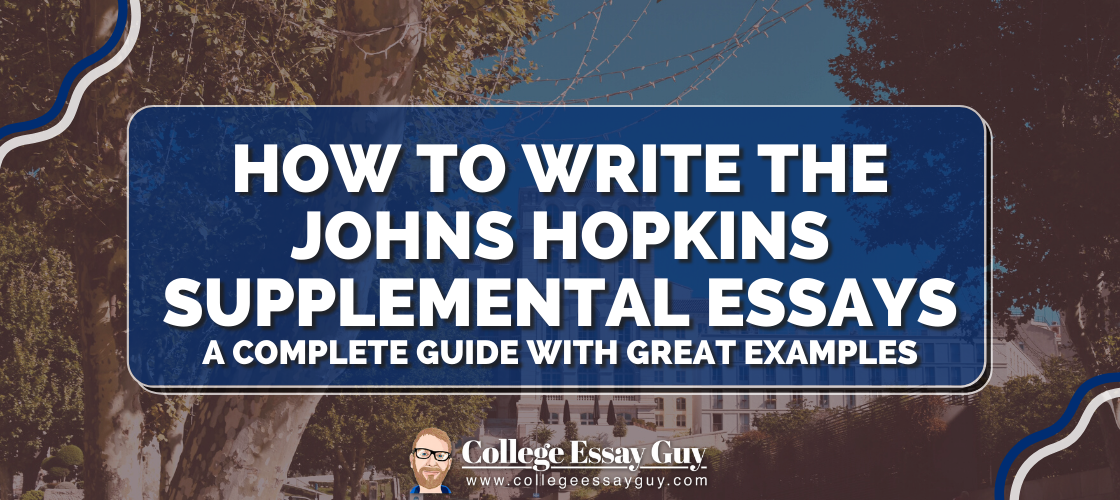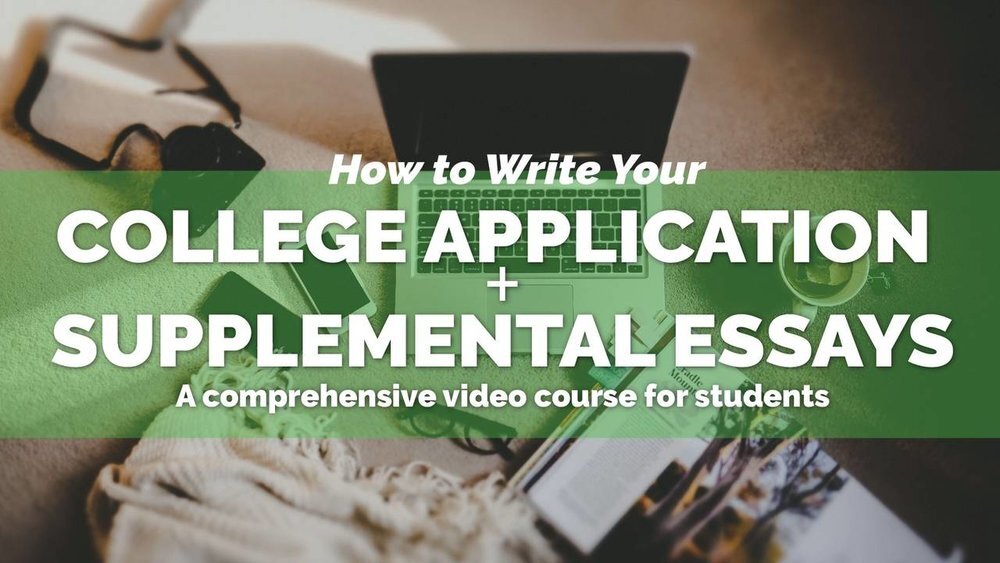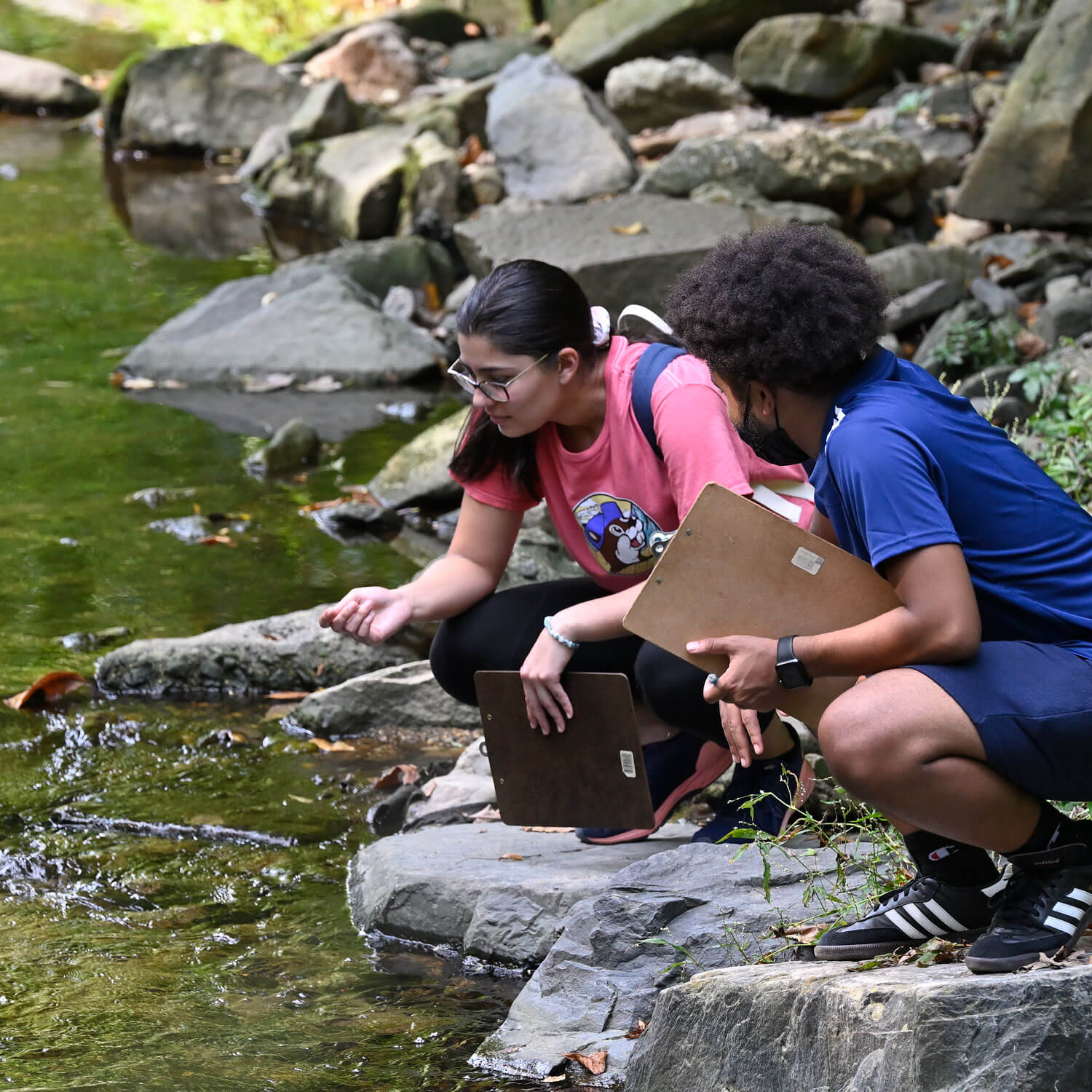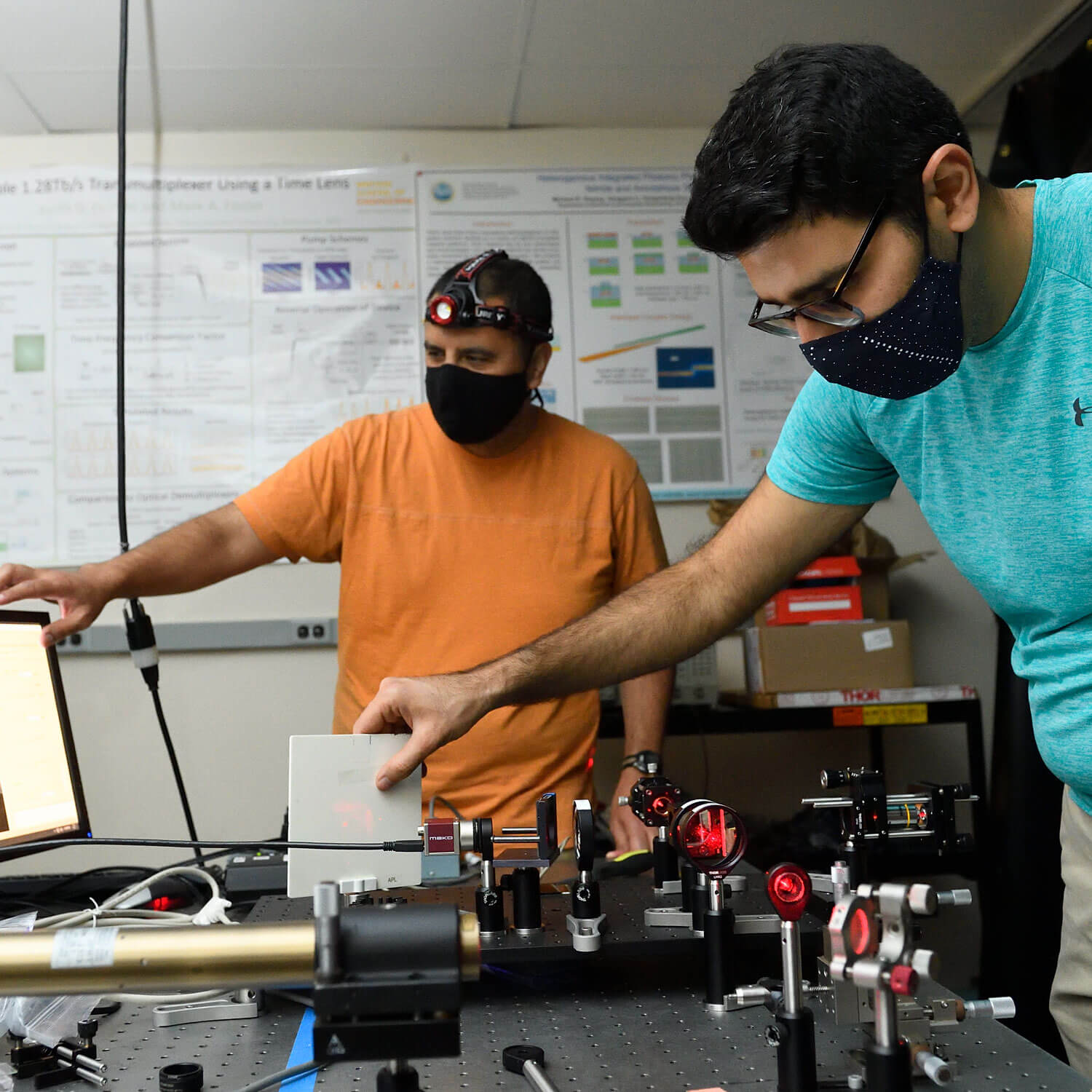6 Outstanding Johns Hopkins Essays That Worked for 2024

To get into Johns Hopkins University in 2024, you'll need to make sure your essays that help you stand out.
You may know that John Hopkins releases essay examples every so often.
And in this article, I've gathered 6 additional incredible Johns Hopkins essays from admitted students.
Whether you're a student or parent of an applicant, get inspired and real insight into JHU admissions.

What is John Hopkins University's Acceptance Rate?
Getting into Johns Hopkins is difficult. Last year, over 37,150 students applied to Johns Hopkins and 2,407 were admitted.
That means Johns Hopkins had an overall acceptance rate of 6.5%, or in other words about 1 in 15 students get admitted each year
Johns Hopkins Acceptance Scattergram
Luckily, if you want to maximize your chances of getting into Johns Hopkins, your essays make sure you have your best chance of acceptance.
For top schools like Johns Hopkins, your essays matter more.
What are the Johns Hopkins Supplemental Prompts for 2022-23?
This year, Johns Hopkins requires applicants to write one essay of 300-400 words in response to its writing supplement question.
Here are the Johns Hopkins writing supplement prompts for this year:
- Founded in the spirit of exploration and discovery, Johns Hopkins University encourages students to share their perspectives, develop their interests, and pursue new experiences.
Use this space to share something you’d like the admissions committee to know about you (your interests, your background, your identity, or your community), and how it has shaped what you want to get out of your college experience at Hopkins. (300-400 words)
6 Additional Johns Hopkins EssaysThatWorked
These are 6 additional Johns Hopkins essays that worked written by admitted students. Here you can read their essay examples and see how they got accepted.
I've also included some Common App essays written by admitted JHU students.
- 1. Runners Take Your Marks
- 2. Percussive Marching Arts
- 3. Constance Care Center
- 4. Governor's School of Science
- 6. Glowing Blob
#1. Johns Hopkins Supplement Example: Runners Take Your Marks
Prompt: Successful students at Johns Hopkins make the biggest impact by collaborating with others, including peers, mentors, and professors. Talk about a time, in or outside the classroom, when you worked with others and what you learned from the experience. (300-400 words)
"Runners take your marks, get set, collaborate?"
When one attempts to characterize the sport of cross-country, the term 'teammates' rarely comes to mind. More commonly, the activity is associated with words such as 'champion' or 'competitor', both singular nouns. Therefore, it is not difficult to imagine the extent of my surprise when, stepping into my first-ever cross-country practice as a lanky ninth-grader, I witnessed the sense of camaraderie present among the more established members of the team. Despite my acknowledgement of these runners as teammates, I held my opposing views of cross-country and of collaboration at the poles of my mind, convinced that the two were terminally incompatible. Stubbornly clinging to this black-and-white philosophy, I carried it with me throughout the season's inaugural meet, unaware of the burden that such a dichotomous perspective created. Instead of tuning into the motivated cheering of coaches, I tuned into the laborious pumping of my arms, resultant of the intensity of the race.
Opposed to focusing on the changes in pace effected by my teammates, I chose to focus on the chafing around my ankles, resultant of an ill-fitting pair of racing spikes. Intent of ensuring my own success, I willfully ignored the reality that, although my teammates were assuming the role of rivals, my teammates were simultaneously assuming the role of collaborators, purposefully striving to ensure the success of one another. Consequently, the competing teams engaging in cooperative conduct similarly happened to be the teams with the greatest overall achievement at that first meet.
While witnessing the success of collaborative teams certainly set into motion a transformation of my polarized perspective in regards to cross-country, the true catalytic factor materialized itself as the interactions carried out between my teammates and I. As the season progressed, and as I gradually gained awareness of the team's nuanced character, I noticed that the strengths of one teammate served to supplement the weaknesses of another. Where one teammate may have fallen short on rhythm near the conclusion of a race, for example, another teammate would provide a blazing final 'kick'. Equipped with a transformative understanding of team dynamics, I ultimately came to realize that cooperative achievement arises not from compromise, but rather from the constructive amalgamation of distinctive individual qualities.
As I toe the starting line of an undefined future, I will undoubtedly carry these indelible lessons with me throughout the entirety of life's most daunting race.
#2. Johns Hopkins Supplement Example: Percussive Marching Arts
There is something intimate, almost profound, in mirroring the movements of about 14 people around you.
From paralleling the idiosyncrasies of a vibraphone player’s smile to the nuances of a marimba player’s wrist movements, it is difficult to achieve total nonverbal communication in a band’s front ensemble. The result, however, is an infinitely rewarding one; the visual mosaic we design — whether inside the confines of a gymnasium floor or on an expansive stretch of turf on a football field — is akin to the aural one we create as well. This tapestry, while ostensibly uniform, is woven with the gradations of every player’s physical form, their quirks quickly adopted by the whole ensemble.
Indeed, pantomiming and performing become one in the same in the stationary percussive marching arts. This mimicry demands a sacred conviction that every player will commit to maintaining the mosaic that we’ve worked so hard to build. The tense moment when each player waves his or her mallets above the board permits no hesitation; there is no room to confirm the camaraderie between players before striking the keys. We are forced to trust that everything will fall into place, and the tapestry will unfold as it should to captivate our audience.
I’ve learned a lot from playing mallet percussion across the ensembles offered at my school, but the most important thing I’ve learned is to relax, and allow the hours me and my peers have put into rehearsal take their course. I am a notoriously anxious person, obsessed with precision and perfection. Performing is anything but precise; it’s fluid and expressive. When the drum major counts off, I cannot worry about my stance behind the board, or if how much torque I am applying to the first stroke is the same as the person next to me. I must be unapologetically confident.
The faith that I’ve cultivated in my peers in creating this musical tapestry has translated to an increased faith in myself and my own abilities. No longer am I afraid to explore new talents, or take intellectual excursions into fields unbeknownst to me. I am free to teach myself anything, from the entirety of Claude Debussy's works on piano to the John Cena theme song on recorder. Indeed, contributing to something greater than myself has fundamentally changed who I am for the better.
#3. Johns Hopkins Common App Essay Example: Constance Care Center
Common App Prompt #5: Discuss an accomplishment, event, or realization that sparked a period of personal growth and a new understanding of yourself or others. (250-650 words)
Why This Essay Works:
This student uses vulnerability in admitting that they held preconceived notions about the elderly before this experience. The quote introduces these preconceived notions well, while the description of how this student got their job in the care facility is also engaging.
Admission officers love to see your interactions with others. Showing how you interact reveals a lot about your character, and this essay benefits from reflecting upon the student's relationship with a particular elderly individual.
What They Might Improve:
It is good to be descriptive, but only when it supports your expression of ideas. In this essay, the author uses adjectives and adverbs excessively, without introducing new ideas. Your ideas are more important than having a diverse vocabulary, and the realizations in this essay are muddled by rephrasing similar ideas using seemingly "impressive," but ultimately somewhat meaningless, vocabulary.
This essay touches on some interesting ideas, but on multiple occasions these ideas are repeated just in different phrasing. If you have already expressed an idea, don't repeat it unless you're adding something new: a deeper context, a new angle, a broadened application, etc. Ask yourself: what is the purpose of each sentence, and have I expressed it already?
It's true that almost any topic can make for a strong essay, but certain topics are trickier because they make it easy to write about overly used ideas. In this essay, the main idea can be summarized as: "I realized the elderly were worthy humans too." It touches upon more interesting ideas, such as how people can be reduced down to their afflictions rather than their true character, but the main idea is somewhat surface-level.
#4. Johns Hopkins Common App Essay Example: Governor's School of Science
#5. johns hopkins personal statement example: riddles.
Common App Prompt #6: Describe a topic, idea, or concept you find so engaging that it makes you lose all track of time. Why does it captivate you? What or who do you turn to when you want to learn more? (250-650 words)
As I was going to St. Ives, Upon the road I met seven wives; Every wife had seven sacks, Every sack had seven cats: Cats, sacks, and wives, How many were going to St. Ives?
The riddles of life were not as straightforward as the puzzles in my books and websites. In fact, they were not straightforward at all, like winding mazes of philosophical quandary.
One of the most thought-provoking subjects that preoccupies my mind regards the existence of aliens. Initially, my mind was settled on the possibility of intelligent life. A universe so big could not possibly be lifeless.
As for the solution to the riddle at the start:
How many were going to St. Ives?
This essay does well by having a unique central topic—riddles—which allows the author to draw out interesting ideas related to this theme. Your topic doesn't necessarily need to be profound or hugely significant, because this author shows how you can take a seemingly unimportant topic and use it to make meaningful connections. In this essay, riddles grow to represent something greater than the activity itself, which is something you can do with almost any topic.
One of the most effective ways to "show, not tell" is to use specific and tangible examples. This essay does a great job of exemplifying their ideas. Rather than just saying "I enthralled my friends with questions," the author also shows this: "Over peanut butter and sliced ham, I assumed the role of story teller..." Examples are always more convincing because they are proof, and allow the reader to interpret for themselves. Don't tell the reader what you want them to think. Instead, set up moments that guide the reader to come to those conclusions themselves.
This conclusion connects back to the beginning, which is generally a good idea as it creates a cohesive structure. However, this ending doesn't quite make sense in the context of the riddle. Rather than creating new meaning, it comes off as arbitrary and contrived. Make sure your conclusion isn't creative just for creative-sake, and instead also has significant meaning attached to it.
#6. Johns Hopkins Personal Statement Example: Glowing Blob
Common App Prompt #7: Share an essay on any topic of your choice. It can be one you've already written, one that responds to a different prompt, or one of your own design. (250-650 words)
The diamond leaves of gnarled oak trees throw spectrums of color onto mounds of frosty snow that gleam melancholily under the moonlight. The leaves chime as wind violently rustles them in a haunting melody. I splinter a leaf off its branch and inspect the shard of my illusion, eyes dancing with amusement.
As I dwell in my worries, a cold hand reaches from behind me and taps my shoulder.
I jerk away, fear bubbling in my amygdala as I look into the nonexistent eyes of my intruding visitor.
The moon illuminates a blob of pink squish as it draws back slowly, points its spindly hands towards my drink and asks: “Could I have some of that?”
The blob wipes its invisible mouth with its nonexistent sleeve. I ask: “What are you?”
The blob tells me to stop looking at it so suspiciously. “I can prove it,” It says. I tell it, please, go ahead.
Suddenly we are back in the glowing forest. “Diamonds? Pah!” The blob dismisses them. Instantly, the leaves turn solid gold, the snow melts, and the wintry world is thrown into a blistering summer.
The blob laughs heartlessly. “Your cortex is under my control,” it says smugly.
“I heard you had a question for me?” It taps its invisible ears knowingly.
The blob wriggles its invisible brows as it waits.
It smiles that wicked smile. It laughs that sinful laugh. Then that insufferable blob wakes me up.
As I sit up in the dark and rub my bleary eyes, I am vaguely aware of the deepset unfulfillment settling itself inside me. I yawn and plop back into bed, the soft red glow of my alarm clock indicating that it is still before midnight.
One thing is for sure about this essay: it has a unique idea that has surely not been written before. Regardless of your topic, you want your essay to be unique in some way, even if it isn't as fantastical as this essay. You can use a unique structure, such as having central symbolism, metaphor, or being structured as a recipe, for example. But this can easily become "gimmicky" if it doesn't have a clear purpose. In general, the most effective way to have a unique essay is to focus on having deep and unique ideas and reflections. By focusing on interesting takeaways and connections that are ultra-specific to you and your experiences, your essay will standout regardless of the structure.
This essay uses a lot of fiction-like writing that is fantastical and "flowery." Although moments of this kind of writing can make your essay more vivid, it is quite easy to end up with dense storytelling and descriptions that ultimately don't share anything interesting about you. The purpose of your essay is ultimately to learn about you: your values, your ideas, your identity, etc. By using dense story-like writing, it can be easy to lose focus of what admissions officers are looking for. In general, avoid writing "fancy" stories like this essay, unless you have a clear and distinct purpose for doing so. Everything in your essay should have a purpose in "going somewhere" (i.e. reaching interesting ideas and takeaways).
This essay is definitely creative, but lacks meaningful takeaways and ideas. By the end of the essay, we don't know much about the author besides the fact that they have an affinity for creative writing and are "on a search." Although the content is unique, the end result comes off as quite generic and surface-level because no interesting thoughts are explored deeply. The most interesting part of this essay is "I open my mouth and ask it my most crucial question," but this is super unsatisfying because the question is never divulged. Instead, the reader is teased by this fantasy story and the essay goes nowhere meaningful, which comes off as gimmicky and "creative for creative's sake," rather than deeply personal and interesting.
This essay ends on the idea of "continuing my search," but for what exactly? It is never explained, elaborated, or even implied (besides one reference to painting earlier). That makes this conclusion comes off as somewhat surface-level and uninteresting. Admissions officers won't care about "your search" unless they have a reason to care. That is, unless it tells something specific about you. On it's own, this idea of "exploring" and "searching" is meaningless because it is too broad and unelaborated.
What Can You Learn From These Johns Hopkins Essays?
If you're trying to get into Johns Hopkins University this year, you'll need to write essays that help you stand out and get accepted. These 6 examples of Johns Hopkins essays that worked show how real students got into JHU in recent years.
In this article, you can read and learn from essay examples responding to the Johns Hopkins writing supplement for 2024 as well as successful Common App personal statements .
Let me know, what did you think of these Johns Hopkins essay examples?
Meet the Author
Ryan Chiang
I'm Ryan Chiang and I created EssaysThatWorked.com - a website dedicated to helping students and their families apply to college with confidence & ease. We publish the best college admissions essays from successful applicants every year to inspire and teach future students.
You might also like:

12 Best Stanford Supplemental Essays That Worked 2024

6 Northwestern Essay Examples & Why Northwestern (2024)

9 Tufts University EssaysThatWorked

8 Notre Dame EssaysThatWorked

What do outstanding essays have in common? Here are our 23 most effective strategies based on lessons from admitted students.
No spam. Unsubscribe anytime.
By signing up you agree to Terms and Privacy Policy
© 2018- 2024 Essays That Worked . All rights reserved.
Registration on or use of this site constitutes acceptance of our Terms and Conditions , Privacy Policy , and Cookie Policy .
We have no affiliation with any university or colleges on this site. All product names, logos, and brands are the property of their respective owners.

Choose Your Test
- Search Blogs By Category
- College Admissions
- AP and IB Exams
- GPA and Coursework
4 Tips for Writing a Johns Hopkins Essay That Works
College Essays

Johns Hopkins University is considered one of the top-10 national schools in the United States. As the country's first research university, Johns Hopkins is interested in fostering lifelong learning and research. Although their medical school is perhaps their most famous department, Johns Hopkins has many prestigious programs—and their reputation means that admittance is extremely competitive, with just a 8% acceptance rate .
If you want to join the band of Blue Jays, you'll need to be a stellar student—and you'll need to write a killer Johns Hopkins essay. This guide will walk you through the Johns Hopkins supplement, including best practices for answering the prompt, how to plan your essay, and analyzing essays that got other applicants in.
Feature Image: Matthew Petroff /Wikimedia Commons
What Should You Know About the Johns Hopkins Supplement?
The Johns Hopkins application process is fairly straightforward. You can apply using the Coalition Application or Common Application , which each have their own essay questions to answer.
In addition to whatever essay you choose for your application, Johns Hopkins asks for an additional required essay of up to 400 words. There is just a single prompt, so no struggling to pick which one will best suit your needs here!

What Is the Johns Hopkins Essay Prompt?
Johns Hopkins has just one essay prompt. The 2022-2023 prompt focuses on collaboration and teamwork, asking you to think about your own role in working with others:
Founded in the spirit of exploration and discovery, Johns Hopkins University encourages students to share their perspectives, develop their interests, and pursue new experiences. Use this space to share something you'd like the admissions committee to know about you (your interests, your background, your identity, or your community), and how it has shaped what you want to get out of your college experience at Hopkins. (300-400 words)
This prompt is a bit less structured than Johns Hopkins essays in the past, which can present new challenges to students. It can be hard to figure out what exactly Johns Hopkins wants you to write about with a prompt like this one! But don't worry: we're going to break it down for you.
What This Prompt Is Asking You to Do
First things first: let's take a closer look at the first sentence of the prompt. In this sentence, Johns Hopkins is outlining exactly what kind of student they want to admit. Admissions counselors are looking for students with diverse ideas and experiences who are curious and passionate. They also want to admit students who aren't stuck in their ways: Johns Hopkins wants their students to be brave enough to try new things, pursue new ideas, and push themselves academically and otherwise.
To that end, this prompt is asking you to share one thing about yourself and how it has impacted both you and your future goals at Johns Hopkins.
How to Answer the Prompt
To answer this prompt well , you need to zero in on an aspect of your personality that a) isn't addressed in your other application materials, and b) fits with Johns Hopkins' mission and academic culture. Our secret trick to choosing the right trait to talk about? Make a list.
Sit down with a pen and paper and write down unique and interesting things about you. While it's good to focus on the categories in the prompt (identity, background, etc.), don't be afraid to branch out if it makes sense. For instance, maybe you have an incredibly interesting hobby or skill you want to share. Even though those things aren't explicitly listed in the prompt, it's okay to list those things down, too.
Once you've built your list, go through and start culling down until you have a topic that works. Here's what you should ask yourself as you start crossing off ideas:
- Do I talk about this in my application already?
- Is this a common topic that other applicants will write about (like being in band or enjoying the outdoors)?
- Is this aspect of your personality too broad or vague?
- Can you tell a story about this part of yourself?
Once you've picked the aspect of your personality that you want to write about, you need to tell a story around it . Don't just say you've hiked the Appalachian trail. Tell a story about your hike. What was it like? What did you experience? Why did you do it in the first place?
And of course, you also have to explain how this aspect of your personality will impact your education at Johns Hopkins. Maybe you decided to hike the Appalachian Trail because you enjoy testing your endurance, and you want to bring that same tenacity to your studies at Hopkins. Make sure you're tying everything back to your education!

There's no wrong way to celebrate a successful essay.
2 Johns Hopkins Essays That Worked
Even with a guide, it can be hard to figure out exactly what Johns Hopkins is looking for in their essays. Thankfully, the college posts successful essays on their website —complete with admissions office comments—giving you the chance to look through Johns Hopkins essays that worked.
These examples are responses to past prompts, so they do some things quite differently. But reading through them can still give you valuable insight into what Johns Hopkins University values in an essay, such as a cohesive look at each applicant and a creative frame for the topic.
#1: "Time to Spin the Wheel"
Add the fact that I was raised in a Bengali household and studied Spanish in high school for four years, and I was able to add other exotic words. Sinfin, zanahoria, katukutu, and churanto soon took their rightful places alongside my English favorites.
And yet, during this time of vocabulary enrichment, I never thought that Honors English and Biology had much in common. Imagine my surprise one night as a freshman as I was nonchalantly flipping through a science textbook. I came upon fascinating new terms: adiabatic, axiom, cotyledon, phalanges … and I couldn't help but wonder why these non-literary, seemingly random words were drawing me in. These words had sharp syllables, were challenging to enunciate, and didn't possess any particularly abstract meaning.
I was flummoxed, but curious … I kept reading.
… and then it hit me. For all my interest in STEM classes, I never fully embraced the beauty of technical language, that words have the power to simultaneously communicate infinite ideas and sensations AND intricate relationships and complex processes.
Perhaps that's why my love of words has led me to a calling in science, an opportunity to better understand the parts that allow the world to function. At day's end, it's language that is perhaps the most important tool in scientific education, enabling us all to communicate new findings in a comprehensible manner, whether it be focused on minute atoms or vast galaxies.
Romila's interest in language is introduced at the very beginning, but the essay takes a surprising turn midway Because she focuses on language, we'd expect that she's interested in pursuing a literature or writing degree; instead, her interest in language helped shape her love for biology.
What works particularly well in this essay is that it demonstrates Romila's unique background as a language-loving biology major of Bengali heritage. She doesn't need to declare her diversity; it's demonstrated through each unique facet of her personality she brings up.
As the admissions committee comments below the essay, Romila also does a wonderful job of showing her interest in interdisciplinary learning . It's not just that she loves linguistics and biology, but that she sees a clear line from one to the other—she loves both of them and the ways that they flow together.
It's unlikely that you have the same experience as Romila, but keep these things in mind when writing your own essay. How can you use your essay to discuss your educational aspirations? Does the work you've done with others fall into interdisciplinary learning? That can be as unconventional as an edible presentation on nuclear physics or as simple as understanding that your soccer team was made up of people with different skills and positions and how, together, you won the championship.
#2: "And on That Note"
While practicing a concert D-flat scale, I messed up a fingering for a low B-flat, and my instrument produced a strange noise with two notes. My band teacher got very excited and exclaimed, "Hey, you just played a polyphonic note!" I like it when accidents lead to discovering new ideas.
I like this polyphonic sound because it reminds me of myself: many things at once. ... Even though my last name gives them a hint, the Asian students at our school don't believe that I'm half Japanese. Meanwhile the non-Asians are surprised that I'm also part Welsh. I feel comfortable being unique or thinking differently. As a Student Ambassador this enables me to help freshman [sic] and others who are new to our school feel welcome and accepted. I help the new students know that it's okay to be themselves.
There is added value in mixing things together. I realized this when my brother and I won an international Kavli Science Foundation contest where we explained the math behind the Pixar movie "Up." Using stop motion animation we explored the plausibility and science behind lifting a house with helium balloons. I like offering a new view and expanding the way people see things. In many of my videos I combine art with education. I want to continue making films that not only entertain, but also make you think.
Like Romila, Curtis' essay uses an introductory framing device—his experience with playing a polyphonic note—to transition into a discussion of all the ways he is multiple things at once.
Demonstrating his multiple interests is part of why Curtis' essay succeeds so well, but most of these examples aren't just examples of contradictions or subverted expectations. They show other things, too, such as the way other people see him (Asian students don't believe he's half Japanese, non-Asian kids only see him as Asian), how his interest in different fields leads him to create unique projects, and how his experience being different allows him to be welcoming to others.
Curtis' writing is lively without getting lost in the metaphor. The framing device is clear, but it doesn't come up so much that it feels too focused on the idea of a polyphonic note. The essay would work just fine without the metaphor, which means his points are strong and sound.
According to the admissions officers' notes, Curtis' essay stood out in part because of the way it shows his ability to think across disciplines. Creative thinking is a huge asset at a research university such as Johns Hopkins. Like Romila's essay, this interest in interdisciplinary learning proves that he'll be a good fit for Johns Hopkins.

4 Key Tips for Writing Your Johns Hopkins Essay
Because the Johns Hopkins supplement has just one prompt, you'll want to do your absolute best on it. That means getting started early and giving yourself plenty of time to polish and refine your work.
As with all college essays, you should go through multiple drafts and seek feedback from others to make sure your essay is as strong as it can be. The earlier you start, the more time you'll have to whip it into shape!
#1: Brainstorm
Remember all those exercises your high school teachers had you work on, such as mind mapping and free writing? Now's the time to bust them out.
Look at the prompt and write down as many short answers as you can think of, no matter how silly they might sound—you don't have to use them if you don't feel strongly about them! If you spend some time writing down all your ideas, you can choose the one that speaks most strongly to you rather than getting midway through an essay before realizing that it's not what you really want to write about.
#2: Be Specific
Specificity is extremely important. With just 400 words, you need to make sure you're using your space wisely.
Tie your idea directly to Johns Hopkins University rather than speaking in generalities. Look through their course catalog and club offerings, and try to connect some of them to your goals and aspirations. Because the prompt asks about collaboration, try to envision yourself in those spaces, accomplishing your goals thanks to your classmates' support.
#3: Get Feedback
Once you've gone through a draft or two, it's time to turn your precious essay over to someone else for feedback. Find people you trust to give you honest and helpful critique. If they're too harsh, you're not going to want to use their advice. But if they focus too much on praise, you might not end up with anything to change.
Look to teachers or other people who have experience with writing—preferably not parents, as they're a little too close to you to be objective—for good advice.
Let all that feedback sit for a while before you sit down to revise your Johns Hopkins essay. Often, our initial response to feedback is to either implement or reject all of it, neither of which is necessarily the best way to improve an essay.
Consider the feedback you receive and find a middle ground between the recommendations and your voice and goals. It's OK if you don't agree with some of it, but do be sure that you always ask yourself why someone might not have understood your meaning. If clarity is an issue, you can still address that even if you don't agree with someone's suggestion.
What's Next?
A good essay is just one part of a successful Johns Hopkins application. Take some time to make sure your GPA , ACT , and SAT scores are up to par, too!
Need some additional help in writing a great college essay? This guide has all the tips and tricks for turning your ideas into essays !
The college application process can be long and confusing, especially when you're applying to a competitive school like Johns Hopkins. This expert guide to college applications will give you all the tips and information you need to create a truly spectacular application!

Trending Now
How to Get Into Harvard and the Ivy League
How to Get a Perfect 4.0 GPA
How to Write an Amazing College Essay
What Exactly Are Colleges Looking For?
ACT vs. SAT: Which Test Should You Take?
When should you take the SAT or ACT?
Get Your Free

Find Your Target SAT Score
Free Complete Official SAT Practice Tests
How to Get a Perfect SAT Score, by an Expert Full Scorer
Score 800 on SAT Math
Score 800 on SAT Reading and Writing
How to Improve Your Low SAT Score
Score 600 on SAT Math
Score 600 on SAT Reading and Writing
Find Your Target ACT Score
Complete Official Free ACT Practice Tests
How to Get a Perfect ACT Score, by a 36 Full Scorer
Get a 36 on ACT English
Get a 36 on ACT Math
Get a 36 on ACT Reading
Get a 36 on ACT Science
How to Improve Your Low ACT Score
Get a 24 on ACT English
Get a 24 on ACT Math
Get a 24 on ACT Reading
Get a 24 on ACT Science
Stay Informed
Get the latest articles and test prep tips!

Melissa Brinks graduated from the University of Washington in 2014 with a Bachelor's in English with a creative writing emphasis. She has spent several years tutoring K-12 students in many subjects, including in SAT prep, to help them prepare for their college education.
Ask a Question Below
Have any questions about this article or other topics? Ask below and we'll reply!
- Search All Scholarships
- Exclusive Scholarships
- Easy Scholarships to Apply For
- No Essay Scholarships
- Scholarships for HS Juniors
- Scholarships for HS Seniors
- Scholarships for College Students
- Scholarships for Grad Students
- Scholarships for Women
- Scholarships for Black Students
- Scholarships
- Student Loans
- College Admissions
- Financial Aid
- Scholarship Winners
- Scholarship Providers
Student-centric advice and objective recommendations
Higher education has never been more confusing or expensive. Our goal is to help you navigate the very big decisions related to higher ed with objective information and expert advice. Each piece of content on the site is original, based on extensive research, and reviewed by multiple editors, including a subject matter expert. This ensures that all of our content is up-to-date, useful, accurate, and thorough.
Our reviews and recommendations are based on extensive research, testing, and feedback. We may receive commission from links on our website, but that doesn’t affect our editors’ opinions. Our marketing partners don’t review, approve or endorse our editorial content. It’s accurate to the best of our knowledge when posted. You can find a complete list of our partners here .
How to Ace the 2024-2025 Johns Hopkins Supplemental Essay Prompts

Varonika Ware is a content writer at Scholarships360. Varonika earned her undergraduate degree in Mass Communications at Louisiana State University. During her time at LSU, she worked with the Center of Academic Success to create the weekly Success Sunday newsletter. Varonika also interned at the Louisiana Department of Insurance in the Public Affairs office with some of her graphics appearing in local news articles.
Learn about our editorial policies

Cari Schultz is an Educational Review Board Advisor at Scholarships360, where she reviews content featured on the site. For over 20 years, Cari has worked in college admissions (Baldwin Wallace University, The Ohio State University, University of Kentucky) and as a college counselor (Columbus School for Girls).

Maria Geiger is Director of Content at Scholarships360. She is a former online educational technology instructor and adjunct writing instructor. In addition to education reform, Maria’s interests include viewpoint diversity, blended/flipped learning, digital communication, and integrating media/web tools into the curriculum to better facilitate student engagement. Maria earned both a B.A. and an M.A. in English Literature from Monmouth University, an M. Ed. in Education from Monmouth University, and a Virtual Online Teaching Certificate (VOLT) from the University of Pennsylvania.

Johns Hopkins University is a private research university located in Baltimore, Maryland. This university is widely known for its emphasis on medicine and science. Johns Hopkins is a highly selective institution that admits only 7% of applicants. Therefore, your application really needs to stand out. One way to do this is by learning how to craft a stellar response to the Johns Hopkins supplemental essays.
The John Hopkins supplemental essay prompt
Supplemental essays are an opportunity to give the admissions office a deeper look into who you are and what you’ll contribute to the university. There is only one JHU essay prompt, but you should make sure that you add a personal touch to stand out. Applying to college isn’t just about academics,– it’s about everything that makes you special!
How has your life experience contributed to your personal story—your character, values, perspectives or skills—and what you want to pursue at Hopkins? (350 word limit)
While this prompt may seem daunting and open-ended, this is the perfect opportunity for you to shine. The main focus of your essay should be what makes you unique in comparison to other applicants.
Get started by asking yourself:
- Will you be a first-generation college student?
- Have you overcome something in your life?
- How have your interests shaped your identity?
- Do you have any notable skills?
Take this opportunity to define yourself outside of academics by telling the admissions office who and what shaped your identity and where and how you spend your time. The prompt is actually quite straightforward in asking you to share about how your “life experience contributed to your personal story ,” so do just that. In addition to what you share, be sure to answer the second part of the prompt that asks specifically about what you “want to pursue” at Johns Hopkins.
Remember to incorporate Johns Hopkins into your story; you chose this university for a reason, and want them to choose you as well. Make your essay personal by explaining how attending John Hopkins will help you become your best self. JHU wants to know how you will make the most of the opportunities presented to you while attending their university.
JHU specific questions to consider
- Does JHU have a unique curriculum you want to study?
- Have you taken trips to the campus before?
- Do you hope to improve the community surrounding Johns Hopkins?
- What do you plan on achieving at Johns Hopkins that you can’t do anywhere else?
- How does JHU connect to the interest, background, identity, or community element that you’ve chosen to share?
Also see: How to write an essay about yourself
Final thoughts for students
Organize your thoughts with an outline before jumping right into writing your supplemental essay. By doing this, your essay will transition smoothly from one thought to the next and avoid unnecessary changes in direction. While it may not seem like it, 300-400 words goes by quickly, so start with your main points before adding additional details.
Before you hit that “submit” button, make sure to:
- Proofread thoroughly to correct grammar mistakes
- Cut out any run-on sentences
- Read your essay aloud at least once to catch any small mistakes you might’ve missed
Don’t miss: How to respond to the Common App essay prompts
Additional resources
Once you’ve completed your Johns Hopkins supplemental essays, there is surely more to be done! Organizing for college can be stressful, but Scholarships360 is here to help. Get a jump on preparing for college with some of our resources to make your application process easier. Learn how to complete the FAFSA and how to compare your financial aid award letters . Throughout your higher education journey, make sure that you are applying for all the scholarships you qualify for!
Other colleges to consider
- University of Chicago (Chicago, IL)
- Rice University (Houston, TX)
- Emory University (Atlanta, GA)
- Vanderbilt University (Nashville, TN)
Start your scholarship search
- Vetted scholarships custom-matched to your profile
- Access exclusive scholarships only available to Scholarships360 members
Scholarships360 Recommended

10 Tips for Successful College Applications

Coalition vs. Common App: What is the difference?

College Application Deadlines 2024-2025: What You Need to Know
Trending now.

How to Convert Your GPA to a 4.0 Scale

PSAT to SAT Score Conversion: Predict Your Score

What are Public Ivy League Schools?
3 reasons to join scholarships360.
- Automatic entry to our $10,000 No-Essay Scholarship
- Personalized matching to thousands of vetted scholarships
- Quick apply for scholarships exclusive to our platform
By the way...Scholarships360 is 100% free!
What are your chances of acceptance?
Calculate for all schools, your chance of acceptance.
Your chancing factors
Extracurriculars.
How to Write the Johns Hopkins University Supplemental Essay 2019-2020

Johns Hopkins University is the oldest research university in the United States. Located in Baltimore, Maryland, it is home to just over 6,000 undergraduate students and more than 19,000 graduate students. Although renowned for its School of Medicine, its undergraduate campus is also highly prestigious.
Undergraduate education at Johns Hopkins University is largely research-based. Nearly 80% of undergraduates perform some kind of independent research throughout their college careers. Johns Hopkins University is also home to the oldest continuously running university press in the United States .
In the 2018-2019 cycle, Johns Hopkins University admitted 9.2% of all applicants. While this this low acceptance rate might be intimidating, there are still ways to improve your odds of acceptance. One of the best ways to stand out is through the essay. Johns Hopkins only requires one supplemental essay for all applicants, so it’s important that you do this one justice. In this post, we’ll break down this essay prompt, as well as the specialized program prompts.
Want to learn what Johns Hopkins University will actually cost you based on your income? And how long your application to the school should take? Here’s what every student considering Johns Hopkins University needs to know.
Make sure to check out How to Write the Common Application Essays 2019-2020 .
For ALL Applicants: Johns Hopkins Supplemental Essay Prompt
In addition to submitting the Common Application, Coalition Application, or Universal College Application, Johns Hopkins University requires applicants to write a supplementary essay. The writing supplement consists of just one essay with a required length of 300-400 words. The prompt included below asks you to recount a time when you collaborated with others and to share your thoughts on the experience. Want to know your chances at Johns Hopkins? Calculate your chances for free right now.
Write a brief essay (300-400 words) in which you respond to the following question: Successful students at Johns Hopkins make the biggest impact by collaborating with others, including peers, mentors, and professors. Talk about a time, in or outside the classroom, when you worked with others and what you learned from the experience.
Although this prompt is fairly straightforward, you should tackle it from a personalized and insightful angle. Choose a moment that you feel really enhanced your teamwork skills.
For example, maybe you worked at a local non-profit and discovered through collaborating with your co-workers that people have different working styles. Or maybe you planned and implemented your senior class project with a group of peers that were less than respectful. Whatever you decide, make sure that it is a story in which you have plenty to say in order to deepen your response.
An Effective, Step-By-Step Approach to Your Essay Response
Note that there are many ways to draft a successful response to this prompt; this guide merely presents one potential way to answer the question.
Introduction
Start your essay response by introducing the moment you are going to reflect on. To hook the reader in a compelling way, you could start with dialogue from you or another person involved. Alternatively, you can choose to begin the essay with a short, impactful sentence.
Regardless, use action words and vivid language to really encapsulate the experience. The goal is to make the admissions committee feel as if they were really there with you. For example:
Four and one, two, three, cha cha cha… four and one, two, three.
My first ballroom competition went by in a blur. Amid the pulsing beat, all I could really remember were flashes. The twirl of my red dress. The tilt of my neck. However, I can recall the countless hours I spent practicing the dance routines with my partner perfectly.

As you continue your essay, develop the feelings and thoughts you experienced as a result of working with others. Further, discuss how you usually dealt with collaboration in the past and if this specific time was more or less challenging for you — show how this specific moment was different.
Before getting involved with ballroom dance, I had never thought of it as a sport. Only after my first practice did I realize how physically and mentally exhausting it is. Even though my dance partner was — and still is — patient with me, it was frustrating to keep making mistakes. To dance properly, there are so many things you have to pay attention to: the tempo, the position of your feet, your posture, and especially your partner’s cues. It was difficult learning to follow his movements.
Lastly, explain why this moment stood out to you, and then reflect on what you think it means. How did the moment change you? Are you a better team player now? Did you learn something about yourself in the process? Really focus on how this moment led to your development; it is important to make the connection clear. Instead of simply starting a new paragraph stating that you are a completely different person, show it through an explicit link.
I am grateful to have joined ballroom dance club for so many reasons. Being a dancer has taught me poise, grace, and strength. But perhaps most importantly, it has challenged me by making me vulnerable to others — especially my dance partner. Not only did I have to become comfortable with being physically close to him, but I had to learn to mirror his movements in a way that looks natural. Even though no words are spoken as part of a dance, it is still an art that requires constant communication.
If possible, also connect your newfound wisdom to your success at college. Show how what you learned during your collaborative experience will help you be a better student. Maybe you’ll work more efficiently on homework because you are able to ask others for advice.
Whatever the case, make it clear that what you learned will stay with you in the future, and especially at Johns Hopkins . The admissions committee wants to know what about the university in particular draws you to it and how it will help you succeed, so don’t be afraid to include specific opportunities that align with your topic.
Through ballroom dance, I have learned to see things from a different perspective. I am better aware of interactions, better able to read other people and better at putting myself out there. I feel more confident now than ever before.
Remember that you only have 400 words for this prompt. Even though it is important to be detailed and descriptive, it is also necessary to stay within the word limit. In order to be succinct while also using rich language, try cutting out unnecessary adjectives and opting for a more varied word choice instead.
Final Reminders
On their website, Johns Hopkins University writes that essays can be one of “ the most important components of your application .” The university stresses the importance of being able to really show the admissions committee what is important to you and to share more about your background. Thus, it is crucial that you include something that really sets you apart in your supplemental essay. Imagine that you were able to meet the admissions committee in person: What would you most want to tell them? Use this hypothetical conversation to inspire a topic for your essay.
If you’d like more inspiration for your Johns Hopkins University writing supplement, you can view previous “essays that worked” on their website . The topics of these essays range from ambidexterity to music to a piece of furniture in a coffee shop. However, they all are able to give insight into the respective author’s character.
Specialized Program Prompts
Woodrow wilson program prompt.
No prompt available yet.
Masters in Global Health Studies Prompt
Identify a global health issue and outline a solution to a key underlying problem. (300 words).
The Global Health Studies Masters program allows “qualified students displaying a strong interest in public health” to pursue a combined Bachelor’s/Master’s with the Bloomberg School of Public Health. If not admitted as a high school senior, you will have the option to reapply to the program as a junior at Johns Hopkins, provided that you declare a major in public health.
Global health is a broad umbrella that can cover diverse issues such as climate change, infectious disease outbreaks, childhood mortality in developing countries, access to contraception, and HIV/AIDS among others. The first step in tackling this prompt is to select a global health issue that you have some familiarity with. You will note that the prompt asks you to propose a solution to the problem of your choice, so it is important that you pick a topic that you’ve had some exposure to.
If you’ve previously worked on a big research project in school or helped to conduct summer research at a lab or university, use that subject as your jumping off point. For example, say you wrote a social science paper about abortion access in the underprivileged areas of your city. You could compare your local findings to international data on abortion access and learn about the ways in which nongovernmental organizations and governments enable or thwart that access. Or, you could use your biology project about the spread of Ebola to figure out what various nations have done to contain major Ebola outbreaks in recent years.
While it helps to have had some prior experience studying a global health problem, it is by no means a prerequisite. Channel your curiosity and seek out books or documentaries about a topic that fascinates you and draw your inspiration for this essay there.
The crucial thing to remember is that you will need to brush up on your global health problem of choice before giving your recommendations. Browse scientific and public policy articles that have been written about your chosen subject matter and figure out which solutions have already been proposed. You’re by no means expected to reinvent the wheel or come up with an ingenious policy solution that will shock the global health community as a high school student. In fact, showing that you’ve done your research and that you’re already familiar with the existing literature on the subject matter will only highlight your dedication to the study of global health.
Keep in mind that you only have 300 words to work with. Use the first 100-150 to outline the problem at hand, and be sure to explain why it matters, why the world should care about it, and why you care about it. Then, provide a brief suggestion on how this problem could be remedied. Don’t list off ten different ways to cure Ebola. Instead, focus on ONE specific strategy and give some detail to explain how it can be adopted. Given the brevity of the response, depth is always better than breadth.
Masters in International Studies Prompt
pick a global leader and discuss how he/she has shaped how you view the world. (300 words).
The Masters in International Studies allows students to pursue a combined Bachelor’s/Master’s degree in international studies at the Johns Hopkins School of Advanced International Studies (SAIS) in Washington, DC. If not accepted as a high school student, you will also have the option to apply again as a Johns Hopkins sophomore.
When choosing the global leader you’re going to discuss, be sure not to select someone well-known purely for their name recognition. Remember, you likely won’t be the only one to think of Angela Merkel and point to her handling of the European immigration crisis as an example of good (or bad) policymaking. Try to select someone whose actions you actively draw inspiration from, and who have had a tangible effect on your choice of academic interests, extracurriculars, or future career path.
Remember, “global leader” does not have to mean head-of-state. Aung San Suu Kyi, prior to her rise to power in Myanmar, spent most of her life under house arrest, but she was undoubtedly recognized worldwide as the leader of Myanmar’s–and perhaps the region’s–pro-democracy movement. Malala Yousafzai, barely out of her teens, is the face of the global fight for a girl’s right to an education under radical Islamist rule. Jack Dorsey is the CEO of one of the most influential social media conglomerates in the world, and he’s never been elected to any public office. If you’re struggling to think beyond the head-of-state box, you can browse places like TIME’s list of the 100 most influential people of 2019 for inspiration.
Once you’ve picked your leader and briefly explain their significance (in about 100-150 words), you need to tell the reader how the person in question influenced you specifically. For example, if you’re talking about Malala, you could explain that her advocacy has inspired you to join a community service group in your town that offers free tutoring to young girls in underprivileged communities. If Jack Dorsey is your pick, you can write about how his insights prompted you to start your own small social media marketing business designed to promote small businesses in your area and enable them to compete against large companies. You need to articulate what it is about your leader’s philosophy, way of life, or professional accomplishments that inspires you. Make sure to also look ahead and elaborate upon how this leader inspires you in your own future career.
For a competitive five-year program, the admissions committee is looking for someone who can demonstrate their critical thinking skills and an ability to think beyond the surface-level idea of leadership. They want applicants to really reflect on individuals that have had a profound impact on the world in recent years. Who you choose to write about matters, but what matters even more is whether you can articulate why the reader should find them important, too.
Peabody Institute Prompt (OPTIONAL)
We would like to hear about any personal or academic issues which might come into play as we process your application..
This prompt is similar to the additional comments section of the Common Application: it gives you the space to account for any discrepancies in your academic record or other particularities that may give the admissions committee pause when reviewing your application.
For instance, if you experienced a serious health issue that prevented you from practicing or performing your music for an extended period of time, you should take this opportunity to elaborate on that experience. Any drastic change in academic performance (for example, going from an A to a B- average in one semester) should also be explained here. There are any number of extenuating circumstances that may have affected your grades—death in the family, major drop in family income or homelessness, moving to a different country, suspension.
Don’t be afraid to provide the context that the admissions officer needs to best understand your circumstances. You are of course under no obligation to share any intimate details of your life that you don’t feel comfortable sharing. Keep in mind, however, that it is always better to preemptively address the questions that may arise than to hope an issue will pass unnoticed.
Related CollegeVine Blog Posts

How to Write the Johns Hopkins Supplemental Essay: Examples + Guide 2023/2024

This research university is renowned for its robust science and medical programs, but school officials make it clear they’re looking for more than academic stars. Each year, they fill their quads and classrooms with not just deep thinkers but doers .
How do you show you’re just what they’re looking for? JHU officials take the time to note that your essays are especially important in revealing to them who you are and “ how you actually think.” And they give you two such opportunities: the Common App personal statement (which, hopefully, you’ve already written) and one supplemental essay, explored in detail below.
Before you write your supplemental essay, get a by-the-numbers look at Johns Hopkins’ offerings, from enrollment and tuition statistics to student life and financial aid information, on its Common Data Set . For deep insights into how America’s oldest research university envisions its role and how it wants to grow and evolve, check out its strategic plan .
And heads-up: Be careful not to write “John” Hopkins in your essay. Yes, it’s actually “ Johns ,” with an “s.”
What is the Johns Hopkins supplemental essay prompt?
Johns hopkins supplemental essay prompt #1.
Tell us about an aspect of your identity (e.g., race, gender, sexuality, religion, community, etc.) or a life experience that has shaped you as an individual and how that influenced what you’d like to pursue in college at Hopkins. This can be a future goal or experience that is either academic, extracurricular, or social. (350-word limit)
How to Write The Johns Hopkins Supplemental Essay Prompt
Most schools ask their applicants to expand on why they’re interested in applying to X school in particular. That’s what we call a “Why us?” essay.
But this question is like a “Why us?” essay … with a twist.
That’s because this prompt flips the “Why us?” question format on its head. At first glance, it seems to be asking “why you?” By that, we mean that it's asking you to elaborate on what makes you a good fit for Johns Hopkins (not what makes Johns Hopkins a good fit for you). It’s asking you to reflect on a community (or multiple communities, or other aspects of your background or experiences) that you’re a part of and then link that to the university.
Before you start writing, we recommend checking out this complete guide on how to write the “Why us?” essay . Pay close attention to the “Why Cornell” and “Why Penn” examples, which are our favorites. Think about how you can incorporate those communities you initially brainstormed into the first part of your essay. That will give your reader a sense of where you’re coming from and how it relates to the interests you want to pursue at Johns Hopkins.
As you write, try to avoid these common mistakes:
Mistake #1 : Writing about the school's size, location, reputation, weather, or ranking.
Mistake #2 : Simply using emotional language to demonstrate fit.
Mistake #3 : Screwing up the mascot, stadium, team colors or names of any important people or places on campus.
Mistake #4 : Parroting the brochures or website language.
Mistake #5 : Describing traditions the school is well-known for.
Mistake #6 : Thinking of this as only a "Why them" essay
Here’s a nice example essay (note that it was written for an older version of the prompt with a slightly different word count, but it would still work well for this year’s).
Decode “jpwoly” . Two years ago, I began an all-girls Cybersecurity team, competing in the national Girls Go Cyberstart competition. It seems obvious that a group of people with varied backgrounds and experiences could generate better ideas on keeping personal information safe, yet cybersecurity is one of the least diverse STEM fields – in 2017, it was 11% female. Sometimes when the community you want doesn’t exist, it means creating your own. During the competition, we four girls spent a week completing hundreds of challenges in cryptography, web analysis, Linux, python, steganography, and more. We quickly realized that though we lacked experience in Cybersecurity, our differing interests and abilities in math or coding were our greatest strength. We delegated many challenges, myself taking cryptography and becoming the resident expert on SQL injections. At the end of Day 1, we were ranked 20th in Colorado, determined to work our way up. We spent far too many hours in our computer science classroom, hogging computers and insisting we just wanted to finish one more challenge. By week’s end, we’d won our state competition and placed ninth nationally. We used the cash prize to form a cybersecurity club, focusing on getting more girls involved. I’m excited that we’re building a community of girls interested in STEM and cybersecurity – this past year, we had 50 girls competing in Girls Go. The original team of four collaborated not only with each other during the competition, but also by encouraging interaction among our peers to grow the program. This kind of collaboration is something that excites me about Johns Hopkins—collaboration that fosters new ideas and solutions to problems, especially through interdisciplinary collaboration. I’m fascinated by biomedical research, and would love the opportunity to do undergraduate research, specifically on cancer. I’d like to work in the Sidney Kimmel Center in lung cancer research, with Shyam Sundar Biswal, as he is doing fascinating research about susceptibility to environmental lung diseases. I’ve done some work with dysplasia and how it is affected by carcinogens, and would like to learn more in this area. Outside of science, I’m also interested in the Peabody school’s dance program. The focus the program places on how dance and science interact allows me to explore two different aspects of my life and how they work together, as well as interact with two different groups of people. By the way, “jpwoly” decodes to “cipher”. — — —
Tips + Analysis
Connect to your values. Through the story of the author’s cybersecurity club, we get a sense that diversity and inclusion in STEM deeply matter to her. Notice that she doesn’t just state the problem; she uses a statistic to give it context and urgency: “in 2017, it was 11% female.” Then she follows up with this gem to show how she feels about taking action: “Sometimes when the community you want doesn’t exist, it means creating your own.” Big(weld) applause.
Maybe get a little geeky. “Cryptography, web analysis, Linux, python, steganography, SQL injections.” These are not terms the average Joanne throws around. They denote some intimate knowledge of coding and programming, allowing this student to demonstrate her command of the subject matter. Note how she uses this language in just a sentence or two. There’s a fine line between showing your expertise and seeming braggy, so do this sparingly, if at all.
Connect collaboration back to JHU. This student uses the latter third of her essay to basically do a mini “Why Johns Hopkins.” Since the prompt asks “how X has shaped what you want to get out of your college experience at Hopkins,” make sure to let them know! And since JHU doesn’t ask explicitly for a “Why us?” essay like many schools do, this strategy may give you the opportunity to show that you and Johns Hopkins are a great fit, and how deeply you “get” this particular school.
Special thanks to Nicole for contributing to this post.

Nicole learned how to tell other people’s stories after a 30+-year career as a newspaper reporter, covering both the mundane and the unforgettable, from serial killer Duane Owen’s retrial, to the Bush/Gore nail-biter, to the homeless family of four who found refuge in a storage unit. Her ideal day is spent playing Cribbage with her dad, beating her husband at RummiKub and planning the next girls trip with her teenage daughters.
Top values: Creativity | Growth | Meaningful Work
Want advice on dozens of other supplemental essays? Click here
Try out the college application + supplemental essays course.
Create amazing supplemental essays for the most selective schools, polish your activities list, and complete everything else with ease and joy. Learn more here.

VIDEO LESSONS
Watch the lessons on your own or via the live option.


Johns Hopkins University | JHU
- Cost & scholarships
- Essay prompt

Want to see your chances of admission at Johns Hopkins University | JHU?
We take every aspect of your personal profile into consideration when calculating your admissions chances.
Johns Hopkins University | JHU’s 2023-24 Essay Prompts
Identity short response.
Tell us about an aspect of your identity (e.g. race, gender, sexuality, religion, community, etc.) or a life experience that has shaped you as an individual and how that influenced what you’d like to pursue in college at Hopkins.? (This can be a future goal or experience that is either academic, extracurricular, or social).
Common App Personal Essay
The essay demonstrates your ability to write clearly and concisely on a selected topic and helps you distinguish yourself in your own voice. What do you want the readers of your application to know about you apart from courses, grades, and test scores? Choose the option that best helps you answer that question and write an essay of no more than 650 words, using the prompt to inspire and structure your response. Remember: 650 words is your limit, not your goal. Use the full range if you need it, but don‘t feel obligated to do so.
Some students have a background, identity, interest, or talent that is so meaningful they believe their application would be incomplete without it. If this sounds like you, then please share your story.
The lessons we take from obstacles we encounter can be fundamental to later success. Recount a time when you faced a challenge, setback, or failure. How did it affect you, and what did you learn from the experience?
Reflect on a time when you questioned or challenged a belief or idea. What prompted your thinking? What was the outcome?
Reflect on something that someone has done for you that has made you happy or thankful in a surprising way. How has this gratitude affected or motivated you?
Discuss an accomplishment, event, or realization that sparked a period of personal growth and a new understanding of yourself or others.
Describe a topic, idea, or concept you find so engaging that it makes you lose all track of time. Why does it captivate you? What or who do you turn to when you want to learn more?
Share an essay on any topic of your choice. It can be one you‘ve already written, one that responds to a different prompt, or one of your own design.
What will first-time readers think of your college essay?
Are you seeking one-on-one college counseling and/or essay support? Limited spots are now available. Click here to learn more.
Johns Hopkins Supplemental Essays 2024-25 — Prompts and Advice
August 23, 2024
In the most recent admissions cycle, Johns Hopkins University admitted approximately 7.6% of applicants into the Class of 2027. As a school that rejects thousands of applicants each year with 1500+ SATs and impeccable transcripts, those hoping for a positive result at JHU need to find additional ways to shine in the eyes of the admissions committee. The Johns Hopkins supplemental essay is one such opportunity.
(Want to learn more about How to Get Into Johns Hopkins University? Visit our blog entitled: How to Get Into Johns Hopkins for all of the most recent admissions data as well as tips for gaining acceptance.)
Given that 19 of every 20 RD applicants to Johns Hopkins University are ultimately unsuccessful, you need to do everything you can to stand out amidst a sea of uber-qualified teens from around the globe. Through its one mandatory essay prompt, Johns Hopkins University’s supplemental section affords applicants an opportunity to highlight what makes them uniquely qualified for admission. Below is Johns Hopkins’s supplemental prompt for the 2024-25 admissions cycle. Additionally, you’ll find our tips on how to write a winning composition.
Johns Hopkins Supplemental Essay Prompt
How has your life experience contributed to your personal story—your character, values, perspectives or skills—and what you want to pursue at hopkins (350 word limit).
JHU is inviting you to share more about your background/identity/community through the lens of how that will impact your experience at the university. Take note of the wide-open nature of this prompt. You are essentially invited to talk about any of the following topics:
- A perspective you hold
- An experience/challenge you had
- A community you belong to
- Your cultural background
- Your religious background
- Your family background
- Your sexual orientation or gender identity
Johns Hopkins Supplemental Essays (Continued)
Although this prompt’s open floor plan may feel daunting, a good tactic is to first consider what has already been communicated within your Common App personal statement and activities list. What important aspect(s) of yourself have not been shared (or sufficiently discussed)? The admissions officer reading your essay is hoping to connect with you through your written words, so—within your essay’s reflection—be open, humble, thoughtful, inquisitive, emotionally honest, mature, and/or insightful about what you learned and how you grew.
You’ll then need to discuss how your background/identity/experiences have influenced what you want to pursue at Hopkins. As such, think about what you learned/gained and how it relates to one of your academic, social, or extracurricular college goals. For example, perhaps growing up in Northern California has made you passionate about post-wildfire ecosystem restoration, which you hope to pursue further through Johns Hopkins’ environmental science program. Or, perhaps your experience as a tutor has made you interested in The Tutorial Project , or the discrimination you watched your sibling face after revealing their gender identity has informed your desire to be part of initiatives like the Safe Zone Program .
To that end, be sure you address how you will take advantage of Johns Hopkins’s immense resources. These resources could be inside and/or outside of the classroom. You can accomplish this by citing specific academic programs , professors , research opportunities , internship/externship programs , study abroad programs , student-run organizations , etc.
How important are the Johns Hopkins supplemental essays?
Johns Hopkins University considers six factors “very important” in evaluating a candidate. The essays are among them. In addition to the essays, Johns Hopkins gives the greatest consideration to the rigor of one’s school record, GPA, standardized test scores, recommendations, and character/personal qualities.
Want personalized assistance?
Are you interested in working with one of College Transitions’ experienced essay coaches as you craft your Johns Hopkins essays? We encourage you to get a quote today.
Looking for more writing resources? You might consider checking out the following:
- Common App Essay Prompts
- 10 Instructive Common App Essay Examples
- College Application Essay Topics to Avoid
- How to Quickly Format Your Common App Essay
- Should I Complete Optional College Essays?
- How to Brainstorm a College Essay
- 25 Inspiring College Essay Topics
- “Why This College?” Essay Examples
- How to Write the Community Essay
- College Essay
Dave Bergman
Dave has over a decade of professional experience that includes work as a teacher, high school administrator, college professor, and independent educational consultant. He is a co-author of the books The Enlightened College Applicant (Rowman & Littlefield, 2016) and Colleges Worth Your Money (Rowman & Littlefield, 2020).
- 2-Year Colleges
- ADHD/LD/Autism/Executive Functioning
- Application Strategies
- Best Colleges by Major
- Best Colleges by State
- Big Picture
- Career & Personality Assessment
- College Search/Knowledge
- College Success
- Costs & Financial Aid
- Data Visualizations
- Dental School Admissions
- Extracurricular Activities
- General Knowledge
- Graduate School Admissions
- High School Success
- High Schools
- Homeschool Resources
- Law School Admissions
- Medical School Admissions
- Navigating the Admissions Process
- Online Learning
- Outdoor Adventure
- Private High School Spotlight
- Research Programs
- Summer Program Spotlight
- Summer Programs
- Teacher Tools
- Test Prep Provider Spotlight
“Innovative and invaluable…use this book as your college lifeline.”
— Lynn O'Shaughnessy
Nationally Recognized College Expert
College Planning in Your Inbox
Join our information-packed monthly newsletter.
First-year essay prompts

Common App has announced the 2024-2025 essay prompts.

Solutions center for first-year students
Solutions center for transfer students.
Johns Hopkins University Supplemental Essays 2022-2023
Johns hopkins supplemental essays 2022 – 2023.
In this guide, we’ll walk you through how to approach each of the Johns Hopkins essays. But before diving into how to write the Johns Hopkins supplemental essays, let’s learn a little about this prestigious university’s history and popularity.
Founded in 1876, Johns Hopkins University is a private research university located in Baltimore, Maryland. Widely considered the first research university in the United States, Johns Hopkins’ popular majors include public health, biomedical engineering, molecular biology, international relations and affairs, and economics. JHU consistently ranks as one of the best universities to study science, specifically biology and public health .
This Johns Hopkins essay guide will teach you how to maximize your Johns Hopkins University essays and increase your chances of admission.
Johns Hopkins Essay: Quick Facts
- Johns Hopkins University acceptance rate: 8%— U.S. News ranks Johns Hopkins as a most selective school.
- 1 essay (300-400 words)
- Johns Hopkins application note: Students must submit their applications via the Common App or Apply Coalition on Scoir . Johns Hopkins admissions look at three important aspects when evaluating applicants: academic character, impact and initiative, and personal contributions.
- Johns Hopkins supplemental essays #1 tip: Applicants who overcome the competitive Johns Hopkins acceptance rate will use their Johns Hopkins supplemental essays to show the admissions committee who they are and how they’ll enrich the Johns Hopkins community. So, try to be creative in your Johns Hopkins supplemental essays.
Does Johns Hopkins require supplemental essays?
Yes—in addition to the main essay prompts on the Common App or Coalition App , you must complete one Johns Hopkins essay . The Johns Hopkins supplemental essay is a key part of your application. For a complete list of application requirements and access to the Johns Hopkins supplemental essays, visit the Johns Hopkins admissions website .
The Johns Hopkins supplemental essays and the Common/Coalition App essay are extremely important, especially given the low Johns Hopkins acceptance rate. Need help navigating your Common App application? CollegeAdvisor.com’s Common App essay breakdown can demystify the process.
JHU is a popular and competitive university. Over 30,000 students applied to be a part of the 2025 class. The school boasts famous alumni like novelist Chimamanda Ngozi Adichie, former New York City mayor Michael Bloomberg, and film director Wes Craven. So, if you get into Johns Hopkins with a strong Johns Hopkins essay, you’ll be in good company.
Your Johns Hopkins supplemental essays can be a great opportunity to introduce yourself to admissions officers, fill in gaps in your application, and make a case for why you deserve an acceptance letter from Johns Hopkins. So, you should do all you can to highlight your strengths in your Johns Hopkins essay. In this guide, we’ll help you craft engaging Johns Hopkins supplemental essays and maximize your admissions odds.
What are the Johns Hopkins essay prompts?
Students will be required to to submit one Common App or Coalition App essay of their choice from the prompts listed on each site. Additionally, all applicants will respond to the same Johns Hopkins application essay prompt.
The following is the prompt for applicants’ Johns Hopkins supplemental essays:
Founded on a spirit of exploration and discovery, Johns Hopkins University encourages students to share their perspectives, develop their interests and pursue new experiences. Use this space to share something you’d like the admissions committee to know about you (your interests, your background, your identity or your community) and how it has shaped what you want to get out of your college experience at Hopkins. (300-400 words)
Like many essay prompts, the Johns Hopkins supplemental essay prompt focuses on the idea of community. Your Johns Hopkins essay should not only highlight who you are as a person, but also what you would bring to campus life. So, successful Johns Hopkins supplemental essays will need to answer both of these questions.
Johns Hopkins Essay Prompt: Preparing your response
Applicants only need to write one Johns Hopkins essay, which has a limit of 300-400 words. Since this is the only Johns Hopkins essay prompt, you’ll want to give the Johns Hopkins essay the attention it deserves.
The Johns Hopkins essay prompt aims to learn more about how students envision themselves contributing to the Johns Hopkins community. When writing your Johns Hopkins supplemental essays, keep in mind the ideas of identity and community. These ideas are extremely open-ended, which gives you lots of flexibility in your Johns Hopkins essay. This also gives applicants the opportunity to get creative with their Johns Hopkins supplemental essays.
While that may be overwhelming, remember that it isn’t necessarily what you choose to write about that matters most; it’s how you do so. So, think carefully about how you structure your Johns Hopkins essay. This starts by choosing the right Johns Hopkins essay topic.
Zoom in on your passions
As you write your Johns Hopkins supplemental essays, focus on your passions. This is one of the most important factors for successful Johns Hopkins University essays. Remember that you will brainstorm, draft, edit, and rewrite your Johns Hopkins supplemental essays many times. So, you’ll want to choose a Johns Hopkins essay topic that you won’t get tired of looking at.
It’s also okay if writing college essays doesn’t come naturally to you. Give yourself ample time prior to the Johns Hopkins application deadline to choose a topic and understand how to write a college essay . Then, you can dig into writing your Johns Hopkins essay.
How do I write the Johns Hopkins essay?
We mentioned before that the Johns Hopkins essay prompt is similar to many other universities’ supplemental essays. Like other prompts, the Johns Hopkins essay prompt gives students the opportunity to share more about their interests , backgrounds, identities, or community. Essentially, Johns Hopkins supplemental essay prompt asks how your experiences have impacted you. It also asks what you want from your Johns Hopkins experience.
Before we get into how to write successful Johns Hopkins supplemental essays, applicants may want to look to other similar prompts from other universities for inspiration on how to get started. Check out our essay guides from Rice University and Caltech , which both have similar prompts.
Research institution
As you approach the Johns Hopkins supplemental essays, remember that Johns Hopkins University is a research institution. Like any university, they want to build a diverse academic community of intellectually curious individuals— inside and outside of the classroom.
This Johns Hopkins essay invites you to share what makes you, you. Then, the Johns Hopkins essay prompt asks how this aspect of your identity will guide your time at Johns Hopkins and beyond. So, strong Johns Hopkins essays will invite the reader into the world of the applicant.
Successful Johns Hopkins University essays will use descriptive, dynamic language. In your Johns Hopkins supplemental essays, focus on setting a scene rather than trying to dazzle readers with SAT vocabulary words. After all, the best Johns Hopkins University essays will be the most authentic.
Ready to craft an impressive Johns Hopkins application essay? Let’s get started.
Organize your thoughts
Begin drafting this Johns Hopkins supplemental essay by thinking about who you are. First, write a list of your key qualities. Then, categorize each item using the criteria in the Johns Hopkins essay prompt: your interests, background, identity, and community.
Distinguish each category—interests, background, identity, and community—as carefully as possible as you start to tackle this Johns Hopkins essay prompt. Begin with your interests. For example, if you devour every article and book you can find on quantum mechanics, that’s an interest you could write about in the Johns Hopkins supplemental essays.
Avoid listing non-intellectual interests like an obsession with learning new TikTok dances. Of course, students who plan to major in dance or sociology may be able to connect these activities to what they hope to experience at Hopkins in order to craft successful Johns Hopkins University essays. However, your Johns Hopkins supplemental essays should showcase you in the best possible light. Think of yourself as a student and community member. Then, use that to guide your Johns Hopkins supplemental essay topic.
Next, shift to your background. Think about where you come from and how these places and experiences have made you who you are. In your Johns Hopkins essay, you’ll want to avoid cliché, overly sentimental aspects of your background. For example, having a parent who attended Johns Hopkins may have shaped why you want to attend. However, this doesn’t tell admissions officers anything interesting about you or what you hope to learn at Johns Hopkins. So, these types of topics won’t lend to crafting impressive Johns Hopkins supplemental essays.
Instead, look for experiences that sparked intellectual curiosity. Are you a softball player that spent a season perfecting your pitch but, in the process, began learning about physics ? That could be a great topic for your Johns Hopkins essay.
After exploring your background, move to identity. When categorizing identity in this Johns Hopkins essay, you may automatically default to the classic definitions: ethnicity, gender, age, religious beliefs, first-generation college student , etc. While there’s nothing wrong with starting here, think outside of the box for this Johns Hopkins essay prompt. Are you a contrarian? An activist? A pessimist? Thinking about the less obvious ways that you self-identify can help you write an interesting Johns Hopkins essay.
Finally, shift to your community. Jot down some of the communities you belong to. Whether it’s a religious community, your neighborhood, or even the building where you live, list the spaces you inhabit.
Again, this Johns Hopkins supplemental essay rewards those who think outside the box. Are you an active member of an online community of gamers? Do you spend time with fellow gardeners sharing tips on how to care for plants? Community manifests in a wide variety of ways. So, as you brainstorm for the Johns Hopkins essay prompt, make sure to cover all important ways you live and work with others.
After jotting down experiences, interests, identities, etc., sit with your list for a day or two. Do any items stick out as a perfect response to this Johns Hopkins essay prompt?
If not, don’t worry. Try our reflection exercises to help you get started. Set a timer and spend 30 minutes or so expanding on a few of your topics. Limit yourself to 10 minutes per topic. Were there any topics that you couldn’t stop writing on? If so, you’ve found the subject for your Johns Hopkins supplemental essay!
Tell the Story
In this Johns Hopkins essay prompt, you only have 300-400 words. Use them wisely to maximize the impact your Johns Hopkins essay can have in admissions.
This word count creates the key challenge of the Johns Hopkins essay: namely, you’ll want to balance a concise structure with descriptive language. Your language should draw the reader into the interest, background, identity, or community your Johns Hopkins essay addresses. At the same time, strong Johns Hopkins supplemental essays will avoid excessive wordiness.
How do I write the Johns Hopkins Essay?- An exercise to get you started
Let’s try an exercise to help you make your Johns Hopkins essay shine. Which of the descriptions below seems more engaging?
Example 1: Since the age of five, I’ve belonged to my local church.
Example 2: There is a pew in the center of my church. If you look closely, you’ll see where I scratched my initials into the wood at age five.
See the difference? Both sentences communicate the same information (church attendance from a very young age). However, the second example provides details that invite the reader into your story. This type of enticing and descriptive writing will often lead to successful Johns Hopkins University essays.
Read over your Johns Hopkins essay carefully. Then, think about how every word serves your essay’s overall narrative. Your Johns Hopkins essay should use as few words to make as significant an impact as possible.
Make Johns Hopkins Connections
This Johns Hopkins supplemental essay isn’t a “Why Johns Hopkins” prompt in the classic sense. However, the Johns Hopkins essay still asks how your identity, background, interests, and community have shaped what you will bring to Hopkins. Johns Hopkins supplemental essays that answer this part of the prompt will be the most impressive.
Maybe you know what you want to major in and can draw a clear connection between your background/identity/community and that intended major. If so, use this Johns Hopkins essay to emphasize that connection. Successful Johns Hopkins supplemental essays will reveal both who an applicant is and why they belong at Johns Hopkins.
Let’s revisit the “gamer community” example.
I have learned so much from organizing coding events in my online gaming forum. My friends from all over the world have shown me that even if we don’t speak the same language, our passion for coding and games is universal. I’m looking forward to taking classes in the JHU video game design lab and building a bridge between my online community and the in-person one I’ll find at JHU.
This example clearly shows us how this student’s gaming interest has prepared them to take full advantage of this JHU-specific program. Successful Johns Hopkins University essays will show, or even hint at, how you would thrive on campus.
If you haven’t chosen your major yet, you can still answer this portion of the Johns Hopkins essay. To do this, you’ll want to make the focus of your Johns Hopkins essay more abstract. For example, let’s say you choose to write about your community, specifically the apartment building you live in.
The hot Houston sun draws the people from my building by late afternoon. Grannies of every race and culture line the long bench in front of the building and watch the younger children play. The other families in building 3318 are like my extended family. I’m reminded of this when I knock on Mr. Johnson’s door to borrow an extra onion for my mom’s soup or when I’m invited to a birthday party for one of the Gonzalez cousins. Family is where you find it, and location makes all the difference. At Johns Hopkins, I’m hoping to build a community like the one that my family and I have found in building 3318.
This example shows how community can be found in many different ways. Successful Johns Hopkins supplemental essays can creatively show how your lived experiences will enhance your time on campus. They will also highlight how you will enrich the lives of those around you at JHU.
Johns Hopkins Essay Reflection Questions:
When you’ve finished your Johns Hopkins essay prompt draft, ask yourself the following questions:
- Do I clearly identify an interest, part of my background, identity, or community?
- Am I writing about my topic using descriptive, dynamic language that draws the reader in?
- Does my Johns Hopkins essay draft show evidence of how this interest, background, identity, etc. has shaped me?
- Is there a connection between my topic and what I hope to learn/experience at Johns Hopkins?
Johns Hopkins supplemental essays & their admissions process
The best Johns Hopkins supplemental essays will be genuine and vulnerable. Johns Hopkins University essays should also showcase traits that would make you a valuable addition to the Johns Hopkins community.
Strong Johns Hopkins supplemental essays should reveal who you are beyond your scores and transcript. This allows the admissions committee to view you as a person rather than a statistic.
Read successful past essays
Every year, the university publishes several successful Johns Hopkins supplemental essays. Read over these Johns Hopkins University essays that worked to get an idea of what impresses admissions. Notice in these Johns Hopkins supplemental essays that each student has a concrete sense of self.
For example, in the Johns Hopkins essay “Red Over Black” by Elizabeth, she discusses how playing solitaire with her grandmother allowed her to learn the value of hard work and self-motivation. Elizabeth shares how that learning shapes every aspect of her life: academics, athletics, and even family life.
Similarly, the Johns Hopkins application essay “Lifelong Learning” by Rozanne explores how her search for passion has allowed her to have and learn from many new experiences. This Johns Hopkins essay is a great example of how applicants don’t have to have a clear career path or even major when applying. Rozanne shows that while she is still discovering her passions, she will be an active participant in the Johns Hopkins community.
Highlight your creativity
You’ll also notice that many of the successful Johns Hopkins supplemental essays are written creatively. Rozanne and Elizabeth both use descriptive language to make us feel like we are right there crocheting and playing solitaire, respectively.
In fact, all of the Johns Hopkins supplemental essays that worked listed on the site are unique. Successful Johns Hopkins University essays are often creative. So, don’t be afraid to start your essay with an exciting and intriguing description to set the scene.
By including these types of Johns Hopkins supplemental essays, the university encourages you to be creative. So, you can structure your response to the Johns Hopkins essay prompt in any number of interesting ways. Think about how you can highlight your creativity in your Johns Hopkins supplemental essays.
Remember the prompt
Make sure your Johns Hopkins essay structure serves the prompt. While creativity is good, you don’t want your Johns Hopkins supplemental essay to look and read like a gimmick. Above all, tell your story in the way most authentic to you.
You’ll notice one successful essay “Stepping Out of my Comfort Zone” by Samuel was more traditional than the others mentioned. However, it’s still listed as one of the top Johns Hopkins University essays submitted. So, don’t feel pressured to write in a way that isn’t true to you. Use your own writing style and voice to best respond to the Johns Hopkins essay prompt.
Finally, and it should go without saying, these Johns Hopkins supplemental essays are examples . So, don’t think of them as a blueprint of how you must structure your own Johns Hopkins supplemental essays. You also shouldn’t compare the experiences shared in these Johns Hopkins supplemental essays with your own.
Finally, the Johns Hopkins supplemental essays are personal statements. Every person is unique—every Johns Hopkins essay will be, too. Strong Johns Hopkins University essays will be inherently individual, so don’t worry if yours doesn’t look like the examples.
Does the Johns Hopkins essay matter?
Every aspect of the Johns Hopkins application is important, from your mid-year report to the Johns Hopkins essay. When applying to JHU , treat each item on the application as crucial to creating a compelling candidate profile.
It will take far more than just meeting the Johns Hopkins application deadline and requirements in order to secure your spot. Make sure to allow yourself enough time to craft compelling Johns Hopkins supplemental essays that will bolster your college application narrative.
With more selective schools like Johns Hopkins, most candidates have high test scores and GPAs. The Johns Hopkins essay, then, becomes a chance for you to truly stand out from other applicants. Since Johns Hopkins has extended their test-optional policy through to the 2025-2026 application year, essays are now more important than ever when trying to stand out among a large pool of qualified candidates. So, strong Johns Hopkins supplemental essays can make a major difference in admissions.
Additionally, applicants may want to submit other supplemental materials to support their Johns Hopkins application essay and overall application narrative. For example, you may want to add a college application letter or an art portfolio. While JHU accepts supplemental materials, they encourage applicants to only submit extra materials if they will genuinely add to their application.
Other Johns Hopkins Resources from CollegeAdvisor
Ranking as #7 on U.S. News Best National Colleges list, it’s no surprise that the Johns Hopkins acceptance rate is so low. As one of the best colleges in the nation, applicants will want to do all they can in order to stand out. An integral deciding factor in the application process are the Johns Hopkins supplemental essays; however, there are other important factors such as applicants’ GPAs and recommendation letters .
While we’ve outlined how to write successful Johns Hopkins supplemental essays in this guide, it’s also important to understand the whole application process. Remember that the Johns Hopkins admissions committee will look for applicants who show academic excellence and community involvement. So. make sure that you have a well-rounded application. Strong Johns Hopkins supplemental essays will add important value to your application narrative by filling in any gaps or adding information not mentioned elsewhere.
Additionally, if you’re seriously considering how to get into Johns Hopkins, then you should first look at our guide .
How to Get Into Johns Hopkins Guide
Read Johns Hopkins essay examples
As previously mentioned, the Johns Hopkins admissions site shows some examples of Johns Hopkins University essays that worked. These can give you some inspiration as you craft your own Johns Hopkins essay.
We’ve also chosen some of our favorite successful Johns Hopkins supplemental essays. In this guide , we show some examples of strong Johns Hopkins supplemental essays and explain why they work. While you shouldn’t try to mimic any of these examples, understanding important qualities in successful Johns Hopkins supplemental essays will help you to write your best Johns Hopkins essay. You may also want to look at other successful college essay examples in order to get you motivated and inspired to start writing your Johns Hopkins essay.
Johns Hopkins University Essays that Worked
Another resource that hopeful Johns Hopkins applicants should take advantage of is our Johns Hopkins admissions article . While it’s important to write the best Johns Hopkins supplemental essays possible, it’s impossible to do so without truly understanding what the admissions committee looks for. In this article, we break down acceptance rates and look at the average GPA and standardized test scores for recently admitted JHU students. We also explain how to visit JHU in person or virtually.
Find your fit
Finally, remember to focus on your college fit. The more you know that JHU is the place for you, the stronger your Johns Hopkins essay will be. Your essays, grades, and other application requirements are important, but students should remember that you need to make sure the school is a good fit for you . While JHU is a renowned university, you won’t actually know how you feel on campus until you’re there. Try to visit the school before making important college enrollment decisions down the road. And, lucky for you, if that’s not possible, then there are virtual tours that could show you how you may feel on campus.
Finding Your College Fit
Another great way to learn about Johns Hopkins is by speaking with current students or alumni. You’ll be able to hear about their first-hand experiences of applying to and studying at this prestigious institution. Watch this recent webinar where two alums answer some common questions about what it takes to apply to and attend JHU.
Johns Hopkins University Panel
Once you’ve done some research, you’ll be in an even better position as you approach the Johns Hopkins essay.
Research scholarship opportunities
Scholarships are also an important part of the college application process. With the cost of college so high, it only makes sense to apply to all the scholarships possible in order to lower your education costs. Check out our webinar which gives you tips on making your scholarship and college applications stand out.
Johns Hopkins is committed to admitting the “brightest minds” no matter their socioeconomic status. You can use their college cost calculator to get an estimate of your potential tuition costs. Keep in mind that most schools will give students the opportunity to estimate their tuition cost which may be an important factor when choosing colleges. When considering college costs, use all the resources available. This includes our article which outlines how to pay for college .
Johns Hopkins Essay – Final Thoughts
Completing the Johns Hopkins application essay can seem daunting. Try to view this Johns Hopkins supplemental essay as an opportunity to introduce yourself to the admissions team. Use the Johns Hopkins supplemental essays provided on the JHU site and in our “Johns Hopkins Essays That Worked” article for inspiration. Remember that you have plenty of personal experiences to draw from for this Johns Hopkins application essay—you just have to think critically and creatively about them.
Remember that the Johns Hopkins application essay matters—a lot! Maybe you’re applying with fewer extracurricular activities than you would like or perhaps a lower SAT/ACT score than normally accepted. A well-written Johns Hopkins essay can be the difference. Use this guide to help you approach the Johns Hopkins supplemental essay with a solid strategy and a clear timeline. That way, you’ll have plenty of time to perfect your Johns Hopkins essay before the Johns Hopkins application deadline. Good luck—you’ve got this!
This article was written by Sarah Kaminski. Looking for more admissions support? Click here to schedule a free meeting with one of our Admissions Specialists. During your meeting, our team will discuss your profile and help you find targeted ways to increase your admissions odds at top schools. We’ll also answer any questions and discuss how CollegeAdvisor.com can support you in the college application process.
Personalized and effective college advising for high school students.
- Advisor Application
- Popular Colleges
- Privacy Policy and Cookie Notice
- Student Login
- California Privacy Notice
- Terms and Conditions
- Your Privacy Choices
By using the College Advisor site and/or working with College Advisor, you agree to our updated Terms and Conditions and Privacy Policy , including an arbitration clause that covers any disputes relating to our policies and your use of our products and services.
We need your support today
Independent journalism is more important than ever. Vox is here to explain this unprecedented election cycle and help you understand the larger stakes. We will break down where the candidates stand on major issues, from economic policy to immigration, foreign policy, criminal justice, and abortion. We’ll answer your biggest questions, and we’ll explain what matters — and why. This timely and essential task, however, is expensive to produce.
We rely on readers like you to fund our journalism. Will you support our work and become a Vox Member today?
- Even Better
This is what admissions officers really want to read in college essays
The important thing is not to overthink it.
by Allie Volpe

One of the most memorable essays college admissions counselor Alexis White worked on with a student wasn’t about a harrowing personal challenge or a rewarding volunteering experience. “It started with the sentence ‘My hair arrives in a room before I do,’” says White, the founder and director of the consultancy firm Alexis College Expert. “It just was the best. And everybody who reads it loves it.”
College application essays have an infamous reputation for being one of the most difficult aspects of the application process. But it remains a crucial way to share details about your life and interests — a way to distinguish yourself beyond your grades, test scores, and extracurricular activities, even in the era of ChatGPT (more on that later).
Vox’s guide to college application season
You got into college. How will you pay for it?
Applying to college? Seven current students on how to stand out and stay sane.
Admissions officers are looking to be entertained when reading application essays, White says. Of course, students should use their essay to showcase their curiosities, character, and point of view, but contrary to popular belief, these personal statements don’t need to recount devastating moments of painful growth. “You can be fun,” White says. “You don’t have to have trauma.”
There are a number of essays students will need to write as a part of their college application. Over 1 million students apply to college through the Common App , a streamlined platform that allows students to apply to multiple schools at once. There, students write a personal statement, usually between 500 and 650 words , centered on a student’s identity, beliefs, accomplishments, and interests, and can choose from among seven prompts for the 2024–25 application season. One prompt even allows the applicant to write about a topic of their choice. “Write the essay that your heart wants to write,” says college essay coach Cassandra Hsiao .
Individual colleges also ask for additional shorter pieces ( around 250 words ), also known as supplemental essays, which may ask applicants to explain why they’re applying to this specific school, and about their academic interests and extracurricular activities.
With so much to write, students need to dedicate serious time and effort — White suggests at least eight weeks — into crafting compelling and effective essays. Here’s what college essay pros want applicants to know.
Make sure your essays are unique to you
Students often put pressure on themselves to have a one-of-a-kind essay topic, White says. There are very few unique concepts, she continues, but what will set you apart is your way into the essay. Start strong with an attention-grabbing first sentence, experts say, that immediately hooks the reader.
Can’t decide what to write? Try these exercises.
Look around your house or room and pick 10 items that spark a memory — like a soccer trophy or a painting you made — and write them down. Or recount a typical day in your life in detail, from the music you listen to in the shower to the snack you grab before bed.
The point, Brook says, is to home in on things that you may think of as humdrum, but that you can use to tell a story about yourself.
Don’t discount minor details when thinking about extracurriculars and accomplishments. “When my kids are stuck, it’s a lot of chatting about things that they think don’t matter and then we typically come to something really great,” says Tyler.
Another tactic is picking five adjectives would you use to describe yourself, suggests White. Expand on each with an experience or memory.
Focus on developing a unique lens through which to see an event in your life, with an original point of view. These can be small moments, says Stacey Brook, the founder and chief adviser at College Essay Advisors . For example, one student she worked with wrote an essay about bonding with her mother during drives to gymnastics practice. After the student got her license and no longer had these moments with her mother, she wrote, she felt a sense of loss. “She was reflecting on what those drives meant to her and what it means to grow up and to gain things and lose them at the same time,” Brook says. “That’s the tiniest moment, the smallest slice of life out of which you can make an incredible essay.”
Even if you’re writing about a common topic, like school sports or lessons learned from an adult in your life, one way to differentiate your essay is to add dialogue, Hsiao says. “It’s in the specificity that only you can write because you went through that,” she says.
Avoid regurgitating your resume, Hsaio continues. Instead, lead the reader through a narrative arc showing your growth. You don’t need to explicitly state what you learned from the experience. Instead, use descriptive, scene-setting language — about how tense you were during that big game or your excitement when you stepped onto the stage — that shows how you’re different on the other side.
Again, you don’t need to share the worst thing that’s ever happened to you — or try to dramatize your life to make it seem more challenging than it is — but help the reader understand the effort you put in to get a new club off the ground, for example. “What you went through objectively might be really small on a global scale,” Hsiao says, “but because it felt big to you and I care about you as the writer, it will feel big to me.”
Don’t even think about copying from ChatGPT (or other generative AI)
While Brook understands the appeal of ChatGPT, experts say don’t use it to write your essay. College application reviewers will be able to tell.
The purpose of these pieces is to display your personality and writing ability and bots will never produce a unique, personalized essay. These chatbots use a style and tone that is immediately identifiable to readers, one that is rife with cliches and an awkward cadence, experts say.
Appropriate uses of generative AI include spell and grammar check or as a thesaurus. “Once you start pulling full paragraphs, you’re cheating,” White says. “It’s not your work.”
Tailor supplemental essays to each school
Depending on the school, you may be asked to write one or two shorter supplemental essays . These prompts may have similar themes, about your academic interests or how you relate to the people around you . For these essays, experts say you can reuse answers for multiple schools — but make sure you revise your answers to be specific to each school.
To ensure you’re tackling supplemental essays efficiently, Brook says to collect all of the prompts for the schools you’re applying to and see where they overlap. Hsiao suggests brainstorming three or four activities, obsessions or aspects of your life you know you want to showcase and try to match these topics to essay prompts. This can be anything from an extracurricular to your favorite TV show. “We are prioritizing what is important in our lives and then showcasing that by mixing and matching per school for the supplemental essay questions,” she says. For example, if you plan on writing about your future major for one college, adapt that essay to each school. However, make sure you’re researching each university and adding details about their specific program to your piece, Brook says.
For essays asking why you want to attend that specific college, ensure your answers are unmistakably catered to that school. “‘I love Delaware because I can’t wait to go to football games and pledge a sorority, and I’m excited about the business school.’ That is not going [cut it] because you could say that about Rutgers,” says Kyra Tyler , a senior director and college admissions consultant at Bright Horizons College Coach. Instead, pepper your answer with details about school traditions, an honors program you hope to join, interesting research opportunities or what you observed when you went on a tour (whether in person or virtual), Tyler says.
Tell a vivid story — and showcase your writing ability
Not only do your essays need to be of substance, but they should showcase style, too.
Tyler suggests students avoid metaphor: Don’t talk about caring for your younger sibling in the context of a Bluey episode — be straightforward. (“Kids can’t get away from [metaphors],” Tyler says, “and what happens is they get stuck under them, and they can’t write.”) You’ll want to write vividly using concrete examples instead of plainly spelling everything out, White says. For instance, if you were a camp counselor who helped a nervous child come out of their shell, write a scene showing the camper interacting with other kids rather than simply saying the camper was less reserved.
Write as if you were talking to your best friend, Tyler says. Avoid slang terms, but let your personality come through your writing. Try reading your essay aloud to see if it sounds like you.
Don’t forget about the basics, like good grammar, proper spelling, and word choice (make sure you’re not repeating similar words and phrases). You don’t need to focus on the five-paragraph structure, Hsiao says. Just make sure you’re telling a compelling story. Have a trusted adult, like a teacher or parent, read your essay to help point out style and structural issues you may have missed.
After you’ve completed a draft, set it aside for a few days, come back to it with fresh eyes for revisions, Tyler says.
College application essays are your chance to share who you were, who you are, and how this university will shape who you hope to be, Hsaio says. Focus on topics you want admissions officers to know and let your voice and passion carry the essay.
Correction, September 19, 11 am ET: A previous version of this story conflated the number of applicants with the number of applications sent through the Common App. Over 1 million students apply using the Common App.
Most Popular
- The Supreme Court is about to decide whether to interfere in the election again
- Trump’s health care plan exposes the truth about his “populism”
- The biggest unanswered questions about the Hezbollah pager attack
- Sign up for Vox’s daily newsletter
- Is my dentist scamming me?
Today, Explained
Understand the world with a daily explainer plus the most compelling stories of the day.
This is the title for the native ad
More in Even Better

The collective freakout about the youth mental health crisis has reached a tipping point.

Experts are losing a little sleep over the latest Missouri case, but that doesn’t mean you should.

From prebiotic sodas to collagen waters, beverages are trying to do the most. Consumers are drinking it up.

How to survive the coming onslaught of viral illnesses.

It’s all about getting them comfortable with the unfamiliar.

Don’t be taken in by “fridgescaping.”

Johns Hopkins University 2021-22 Supplemental Essay Prompt Guide
Regular Decision:
Johns Hopkins University 2021-2022 Application Essay Question Explanations
The Requirements: 1 essay of 300-400 words.
Supplemental Essay Type(s): Community
Founded in the spirit of exploration and discovery, Johns Hopkins University encourages students to share their perspectives, develop their interests, and pursue new experiences.
Use this space to share something you’d like the admissions committee to know about you (your interests, your background, your identity, or your community), and how it has shaped what you want to get out of your college experience at hopkins. (300-400 words).
JHU is purposefully leaving this question super open-ended, so that you can write about any facet of your background or community that has been most integral in shaping your identity. Admissions also wants to know how this aspect of your experience has impacted what you want to seek from your time attending Hopkins. So, start by thinking about your identity. You can write down some words that you would use to describe yourself, or work backwards by thinking about what you hope to gain by attending Hopkins, and then consider how that relates to your interests, identity, background, or community.
Maybe you dream of becoming a surgeon, specializing in gender affirming surgery, to marry your interest in science and medicine with your passion for helping members of the trans community. Perhaps you don’t know what you want to major in yet, but you hope to expand your horizons at JHU as a first-generation student, sharing what you absorb with your relatives so that they can learn alongside you. As long as you put aside time to brainstorm freely and edit meticulously, we’re confident you’ll impress admissions with your response!
About CEA HQ
View all posts by CEA HQ »
Check out our YouTube Channel!
Contact us for information on rates and more!
- I am a * Student Parent Potential Partner School Counselor Private College Counselor
- Name * First Last
- Phone Type Mobile Landline
- Street Address
- Address City State / Province / Region Afghanistan Albania Algeria American Samoa Andorra Angola Anguilla Antarctica Antigua and Barbuda Argentina Armenia Aruba Australia Austria Azerbaijan Bahamas Bahrain Bangladesh Barbados Belarus Belgium Belize Benin Bermuda Bhutan Bolivia Bonaire, Sint Eustatius and Saba Bosnia and Herzegovina Botswana Bouvet Island Brazil British Indian Ocean Territory Brunei Darussalam Bulgaria Burkina Faso Burundi Cabo Verde Cambodia Cameroon Canada Cayman Islands Central African Republic Chad Chile China Christmas Island Cocos Islands Colombia Comoros Congo Congo, Democratic Republic of the Cook Islands Costa Rica Croatia Cuba Curaçao Cyprus Czechia Côte d'Ivoire Denmark Djibouti Dominica Dominican Republic Ecuador Egypt El Salvador Equatorial Guinea Eritrea Estonia Eswatini Ethiopia Falkland Islands Faroe Islands Fiji Finland France French Guiana French Polynesia French Southern Territories Gabon Gambia Georgia Germany Ghana Gibraltar Greece Greenland Grenada Guadeloupe Guam Guatemala Guernsey Guinea Guinea-Bissau Guyana Haiti Heard Island and McDonald Islands Holy See Honduras Hong Kong Hungary Iceland India Indonesia Iran Iraq Ireland Isle of Man Israel Italy Jamaica Japan Jersey Jordan Kazakhstan Kenya Kiribati Korea, Democratic People's Republic of Korea, Republic of Kuwait Kyrgyzstan Lao People's Democratic Republic Latvia Lebanon Lesotho Liberia Libya Liechtenstein Lithuania Luxembourg Macao Madagascar Malawi Malaysia Maldives Mali Malta Marshall Islands Martinique Mauritania Mauritius Mayotte Mexico Micronesia Moldova Monaco Mongolia Montenegro Montserrat Morocco Mozambique Myanmar Namibia Nauru Nepal Netherlands New Caledonia New Zealand Nicaragua Niger Nigeria Niue Norfolk Island North Macedonia Northern Mariana Islands Norway Oman Pakistan Palau Palestine, State of Panama Papua New Guinea Paraguay Peru Philippines Pitcairn Poland Portugal Puerto Rico Qatar Romania Russian Federation Rwanda Réunion Saint Barthélemy Saint Helena, Ascension and Tristan da Cunha Saint Kitts and Nevis Saint Lucia Saint Martin Saint Pierre and Miquelon Saint Vincent and the Grenadines Samoa San Marino Sao Tome and Principe Saudi Arabia Senegal Serbia Seychelles Sierra Leone Singapore Sint Maarten Slovakia Slovenia Solomon Islands Somalia South Africa South Georgia and the South Sandwich Islands South Sudan Spain Sri Lanka Sudan Suriname Svalbard and Jan Mayen Sweden Switzerland Syria Arab Republic Taiwan Tajikistan Tanzania, the United Republic of Thailand Timor-Leste Togo Tokelau Tonga Trinidad and Tobago Tunisia Turkmenistan Turks and Caicos Islands Tuvalu Türkiye US Minor Outlying Islands Uganda Ukraine United Arab Emirates United Kingdom United States Uruguay Uzbekistan Vanuatu Venezuela Viet Nam Virgin Islands, British Virgin Islands, U.S. Wallis and Futuna Western Sahara Yemen Zambia Zimbabwe Åland Islands Country
- Which best describes you (or your child)? High school senior High school junior College student College grad Other
- How did you find CEA? Internet Search Podcast New York Times Guidance counselor/school Social Media YouTube Friend Special Event Delehey College Consulting Perks at Work Other
- Common App and Coalition Essays
- Supplemental Essays
- University of California Essays
- University of Texas Essays
- Resume Review
- Post-Grad Essays
- Specialized Services
- Waitlist Letters
- Private School Essays
- General College Counseling
- School list with priorities noted:
- Anything else we should know?
- Email This field is for validation purposes and should be left unchanged.
School Stats:
- Agnes Scott College
- Alvernia University
- American University
- Amherst College
- Babson College
- Bard College
- Barnard College
- Baylor University
- Bennington College
- Bentley University
- Berry College
- Bethany College
- Boston College
- Boston University (BU)
- Bowdoin College
- Brandeis University
- Brown University
- Bryn Mawr College
- Bucknell University
- Butler University
- California Institute of Technology (Caltech)
- California Lutheran University
- Capitol Technology University
- Carleton College
- Carnegie Mellon University (CMU)
- Catawba College
- Centre College
- Chapman University
- Claremont McKenna College
- Clark University
- Clemson University
- Coastal Carolina University
- College of Charleston
- College of William and Mary
- College of Wooster
- Colorado College
- Colorado School of Mines
- Columbia University
- Cornell University
- Culver-Stockton College
- D'Youville University
- Dartmouth College
- Davidson College
- Dickinson College
- Drexel University
- Duke University
- Earlham College
- Elon University
- Emerson College
- Emory University
- Flagler College
- Fordham University
- George Mason University
- Georgetown University
- Georgia State University
- Georgia Tech
- Gonzaga University
- Hamilton College
- Hampshire College
- Harvard University
- Harvey Mudd College
- Haverford College
- Hillsdale College
- Hofstra University
- Howard University
- Illinois Institute of Technology
- Illinois Wesleyan University
- Ithaca College
- Johns Hopkins University
- Kalamazoo College
- Lafayette College
- Lehigh University
- Lewis and Clark College
- Linfield University
- Loyola Marymount University (LMU)
- Lynn University
- Macalester College
- Manchester University
- Marist College
- Mary Baldwin University
- Massachusetts Institute of Technology (MIT)
- Meredith College
- Monmouth College
- Moravian University
- Morehouse College
- Mount Holyoke College
- New York University (NYU)
- North Carolina State
- North Park University
- Northwestern University
- Occidental College
- Oklahoma City University
- Olin College of Engineering
- Pepperdine University
- Pitzer College
- Pomona College
- Princeton University
- Providence College
- Purdue University
- Rensselaer Polytechnic Institute
- Rice University
- Roger Williams University
- Saint Anselm College
- Saint Elizabeth University
- Santa Clara University
- Sarah Lawrence College
- Scripps College
- Seattle Pacific University
- Seattle University
- Siena College
- Smith College
- Soka University of America
- Southern Methodist University
- Spelman College
- St. John’s College
- Stanford University
- Stevens Institute of Technology
- Stonehill College
- Swarthmore College
- Syracuse University
- Texas A&M University
- Texas Christian University (TCU)
- The College of Idaho
- The George Washington University
- The New School
- Trinity College
- Tufts University
- Tulane University
- UNC Wilmington
- University of California
- University of Central Florida (UCF)
- University of Chicago
- University of Cincinnati
- University of Colorado Boulder
- University of Florida
- University of Georgia (UGA)
- University of Illinois Chicago (UIC)
- University of Illinois Urbana-Champaign
- University of Maryland
- University of Massachusetts Amherst
- University of Massachusetts Lowell
- University of Miami
- University of Michigan
- University of Minnesota
- University of Mississippi (Ole Miss)
- College of Mount Saint Vincent
- University of North Carolina at Chapel Hill (UNC)
- University of North Carolina at Charlotte
- University of North Carolina at Greensboro
- University of Notre Dame
- University of Oklahoma
- University of Oregon
- University of Pennsylvania
- University of Pittsburgh
- University of Richmond
- University of Rochester
- University of San Diego
- University of San Francisco
- University of Southern California (USC)
- University of Texas at Austin
- University of Tulsa
- University of Vermont
- University of Virginia (UVA)
- University of Washington
- University of Wisconsin-Madison
- Vanderbilt University
- Vassar College
- Villanova University
- Virginia Tech
- Wake Forest University
- Washington and Lee University
- Washington University in St. Louis
- Wellesley College
- Worcester Polytechnic Institute (WPI)
- Yale University

Want free stuff?
We thought so. Sign up for free instructional videos, guides, worksheets and more!

One-On-One Advising
Common App Essay Prompt Guide

Supplemental Essay Prompt Guide
- YouTube Tutorials
- Our Approach & Team
- Undergraduate Testimonials
- Postgraduate Testimonials
- Where Our Students Get In
- CEA Gives Back
- Undergraduate Admissions
- Graduate Admissions
- Private School Admissions
- International Student Admissions
- Common App Essay Guide
- Supplemental Essay Guide
- Coalition App Guide
- The CEA Podcast
- Admissions Stats
- Notification Trackers
- Deadline Databases
- College Essay Examples
- Academy and Worksheets
- Waitlist Guides
- Get Started

Hopkins Insider - Essays That Worked 2021

- College Planning Guide
- Essays That Worked
A Wider Lens

Musical Movement

The Blue Armchair

A Study in Ambidexterity

20 Questions
Categories that may interest you.

Campus Resources

Entrepreneurship

Internships

Student Life

Study Abroad

Unexpected Hopkins

Why I Applied
Quick links:.
- Majors, Minors & Programs
- Application Deadlines & Requirements

IMAGES
VIDEO
COMMENTS
Learn from the essays of admitted students who shared their stories, values, and goals with Hopkins. Find examples of essays that used metaphors, reflections, and personal experiences to show who they are and who they'll be in the Hopkins community.
Find out the application deadlines and requirements for first-year and transfer applicants to Johns Hopkins University for the class of 2024. Learn how to apply through the Common Application, Coalition on Scoir, or QuestBridge, and access financial aid and admissions resources.
Learn how to brainstorm, write, and avoid common mistakes for the Hopkins supplemental essay, which asks about your life experience and goals. See examples of topics, connections, and specificity for this competitive school.
Learn how to apply to Hopkins with different admissions plans, deadlines, requirements, and tips. Find out what we look for in applicants and how to showcase your academic character, impact and initiative.
Learn from 6 outstanding Johns Hopkins essays written by admitted students. See how they answered the writing supplement prompts and shared their perspectives, interests, and experiences.
Getting your college essay right is incredibly important, but you already know that or you wouldn't be here. We have compiled a list of our favorite college essays that earned students admission to Johns Hopkins University. We think it's best to jot down your own ideas before clouding your mind with the ideas of others, so quickly type ...
Johns Hopkins is America's first research university, founded on the belief that teaching and research are interdependent, and that a modern university must do both well. Today, we remain a world leader in both teaching and research, with more than 21,000 undergraduate and graduate students studying with esteemed faculty members across nine world-class academic divisions.
Learn how to write a successful Johns Hopkins essay that showcases your personality, interests, and goals. See examples of essays that worked and get tips on how to answer the prompt.
Learn how to write a compelling response to the only JHU essay prompt, which asks you to share an aspect of your identity or a life experience that has shaped you. Find out how to highlight your uniqueness, connect to Johns Hopkins, and avoid common mistakes in your supplemental essay.
Learn how to respond to the Johns Hopkins University essay prompt that asks you to share a time when you collaborated with others and what you learned from the experience. See examples, tips, and a step-by-step approach to write a successful essay.
That will give your reader a sense of where you're coming from and how it relates to the interests you want to pursue at Johns Hopkins. As you write, try to avoid these common mistakes: Mistake #1: Writing about the school's size, location, reputation, weather, or ranking. Mistake #2: Simply using emotional language to demonstrate fit.
Learn how to write a compelling Johns Hopkins supplemental essay with examples from past applicants. See how they addressed the prompt, shared their interests, and connected them to their goals at JHU.
See how transfer applicants to Hopkins shared their stories, goals, and passions in their essays. Learn from their examples and get tips for your own essay.
Learn how to write a compelling essay for Johns Hopkins University | JHU's admissions process. Choose from seven Common App prompts and get free peer review and guidance.
Johns Hopkins University 2024-25 Application Essay Question Explanations. The Requirements: 1 essay of 350 words. Supplemental Essay Type(s): Why. How has your life experience contributed to your personal story—your character, values, perspectives or skills—and what you want to pursue at Hopkins? (350 word limit)
Learn how to write a winning supplemental essay for Johns Hopkins University by sharing an aspect of your identity or a life experience that shaped you. Find tips, examples, and resources from College Transitions experts.
Learn how to craft engaging Johns Hopkins essays and maximize your chances of admission. Find tips, examples, and advice on the Johns Hopkins-specific essay prompt and the Common App or Coalition App prompts.
Common App is a college application platform that offers various essay prompts for students to showcase their background, identity, interest, or talent. Learn about the 2024-2025 essay prompts and get tips on how to write your college essays.
Learn how to craft your supplemental essay for Hopkins by sharing your personal story and how it relates to your academic and community goals. Find out the prompt, tips, and resources for the 2025 entry.
CollegeAdvisor.com's Common App essay breakdown can demystify the process. JHU is a popular and competitive university. Over 30,000 students applied to be a part of the 2025 class. ... Completing the Johns Hopkins application essay can seem daunting. Try to view this Johns Hopkins supplemental essay as an opportunity to introduce yourself to ...
Find resources to build your strongest application for Johns Hopkins University, including essays that worked, application tips, and financial aid information. Learn how to show who you are and how you will thrive in the Hopkins community.
There are a number of essays students will need to write as a part of their college application. Over seven million students apply to college through the Common App, a streamlined platform that ...
Johns Hopkins University 2021-2022 Application Essay Question Explanations. The Requirements: 1 essay of 300-400 words. Supplemental Essay Type(s): Community. Founded in the spirit of exploration and discovery, Johns Hopkins University encourages students to share their perspectives, develop their interests, and pursue new experiences.
Hopkins Insider - Essays That Worked 2021. ... Johns Hopkins University 3400 N. Charles St., Mason Hall Baltimore, MD 21218-2683. GPS address - do not use for mail. 3101 Wyman Park Drive Baltimore, MD 21218. Contact Us. Sign up for our mailing list. Our Story; Alumni Volunteers;